Management Accounting: A Comprehensive Guide to Cost Analysis, Budgeting, and Sustainable Success
VerifiedAdded on 2024/05/21
|25
|5248
|407
AI Summary
This report delves into the intricacies of management accounting, exploring its role in organizational decision-making, cost analysis, and strategic planning. It examines various management accounting systems, including inventory management, cost accounting, job costing, and price optimizing systems, and analyzes their benefits and applications within an organizational context. The report further investigates the integration of management accounting systems and reporting, highlighting their crucial role in achieving organizational goals. It explores different methods used for management accounting reporting, such as accounts receivable aging reports, budgeting reports, order information reports, job cost reports, and performance reports. The report also delves into the calculation of costs using marginal and absorption costing techniques, providing a comprehensive understanding of these methods and their implications for income statement preparation. Additionally, the report examines the advantages and disadvantages of different planning tools used in budgetary control, including PEST analysis, SWOT analysis, balance scorecard, and Porter's Five Forces. It analyzes how these tools can be effectively applied for preparing and forecasting budgets. The report concludes by exploring how organizations are adapting management accounting systems to respond to financial problems and how management accounting can lead organizations to sustainable success. It critically evaluates how planning tools for accounting respond appropriately to solving financial problems to lead organizations to sustainable success.
Contribute Materials
Your contribution can guide someone’s learning journey. Share your
documents today.

Management Accounting
1
1
Secure Best Marks with AI Grader
Need help grading? Try our AI Grader for instant feedback on your assignments.
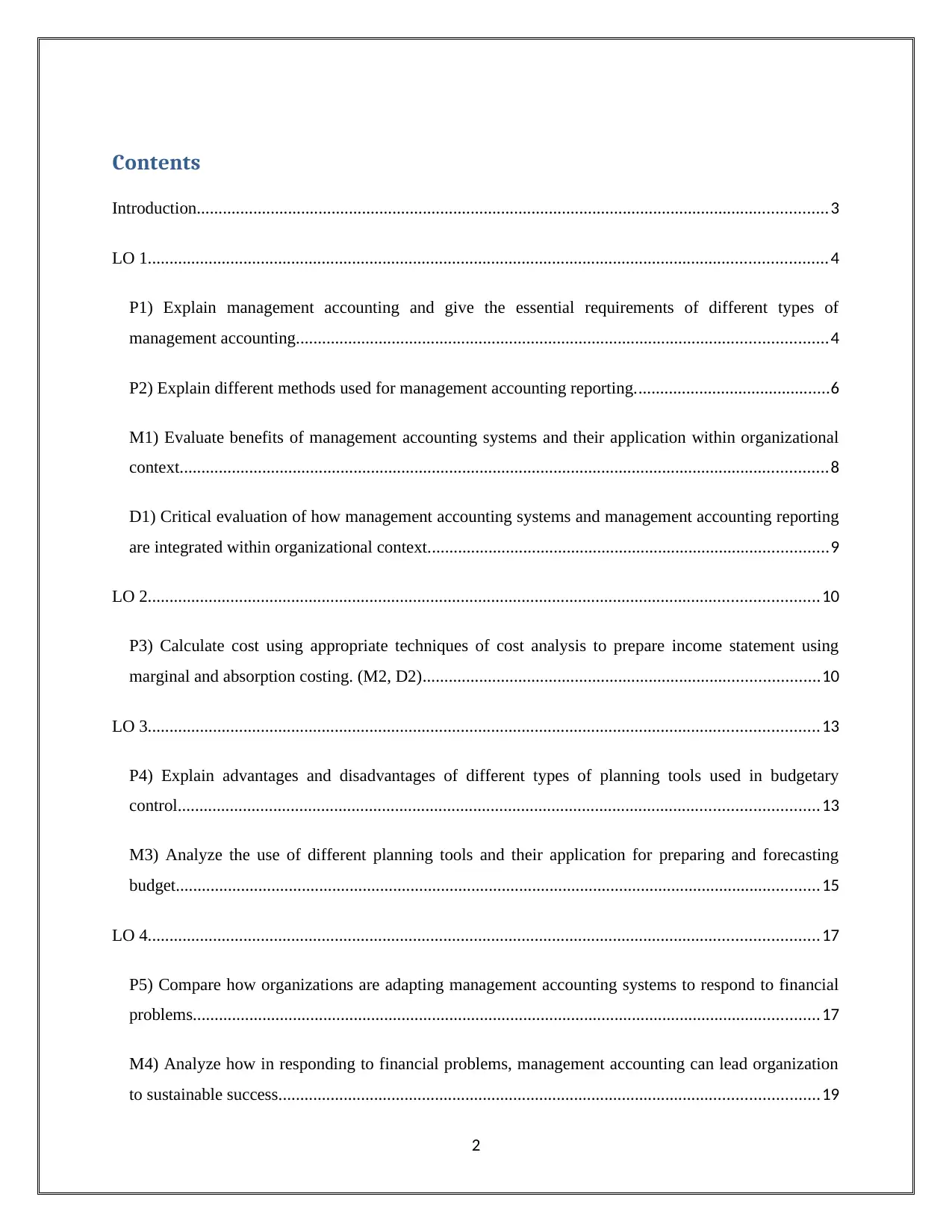
Contents
Introduction.................................................................................................................................................3
LO 1............................................................................................................................................................4
P1) Explain management accounting and give the essential requirements of different types of
management accounting..........................................................................................................................4
P2) Explain different methods used for management accounting reporting.............................................6
M1) Evaluate benefits of management accounting systems and their application within organizational
context.....................................................................................................................................................8
D1) Critical evaluation of how management accounting systems and management accounting reporting
are integrated within organizational context............................................................................................9
LO 2..........................................................................................................................................................10
P3) Calculate cost using appropriate techniques of cost analysis to prepare income statement using
marginal and absorption costing. (M2, D2)...........................................................................................10
LO 3..........................................................................................................................................................13
P4) Explain advantages and disadvantages of different types of planning tools used in budgetary
control...................................................................................................................................................13
M3) Analyze the use of different planning tools and their application for preparing and forecasting
budget....................................................................................................................................................15
LO 4..........................................................................................................................................................17
P5) Compare how organizations are adapting management accounting systems to respond to financial
problems................................................................................................................................................17
M4) Analyze how in responding to financial problems, management accounting can lead organization
to sustainable success............................................................................................................................19
2
Introduction.................................................................................................................................................3
LO 1............................................................................................................................................................4
P1) Explain management accounting and give the essential requirements of different types of
management accounting..........................................................................................................................4
P2) Explain different methods used for management accounting reporting.............................................6
M1) Evaluate benefits of management accounting systems and their application within organizational
context.....................................................................................................................................................8
D1) Critical evaluation of how management accounting systems and management accounting reporting
are integrated within organizational context............................................................................................9
LO 2..........................................................................................................................................................10
P3) Calculate cost using appropriate techniques of cost analysis to prepare income statement using
marginal and absorption costing. (M2, D2)...........................................................................................10
LO 3..........................................................................................................................................................13
P4) Explain advantages and disadvantages of different types of planning tools used in budgetary
control...................................................................................................................................................13
M3) Analyze the use of different planning tools and their application for preparing and forecasting
budget....................................................................................................................................................15
LO 4..........................................................................................................................................................17
P5) Compare how organizations are adapting management accounting systems to respond to financial
problems................................................................................................................................................17
M4) Analyze how in responding to financial problems, management accounting can lead organization
to sustainable success............................................................................................................................19
2
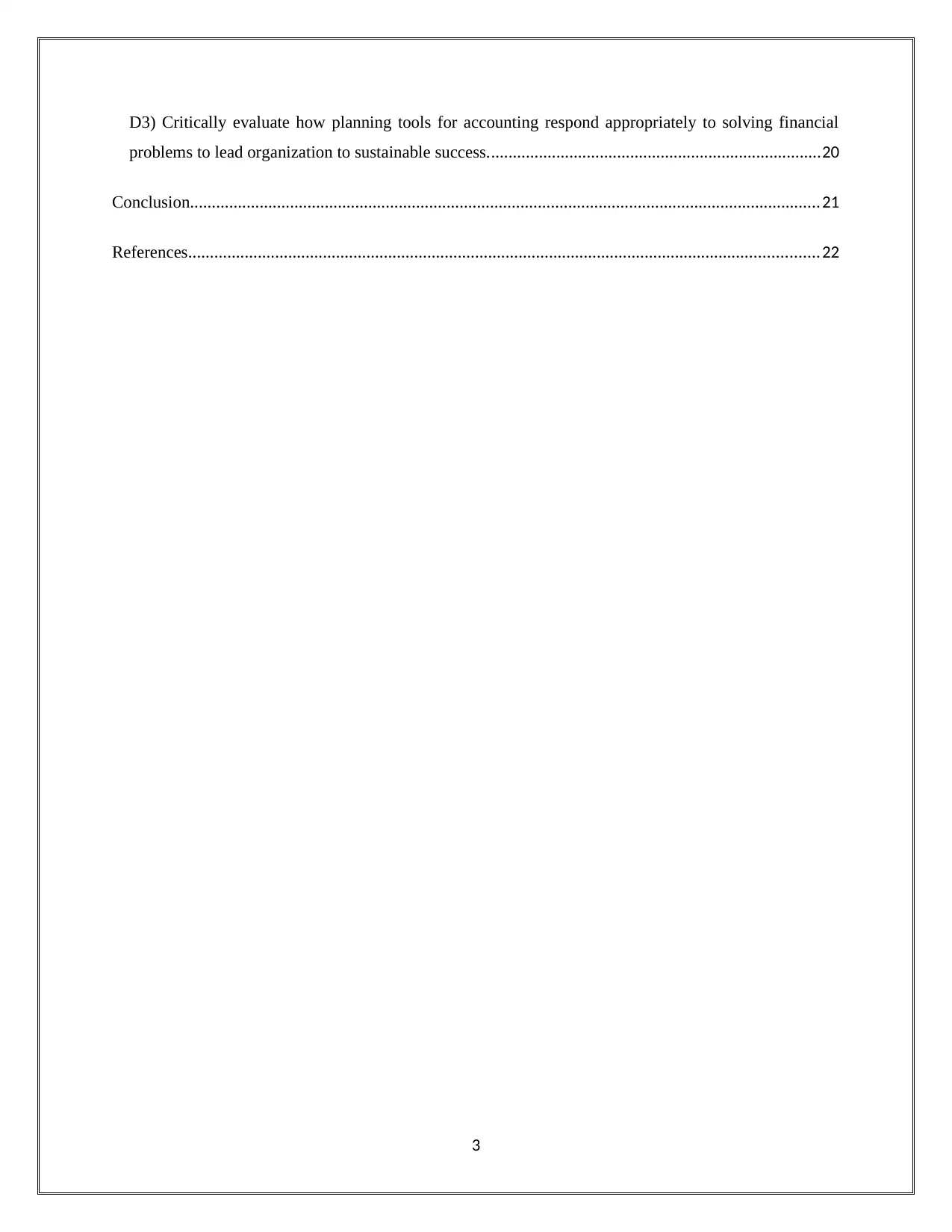
D3) Critically evaluate how planning tools for accounting respond appropriately to solving financial
problems to lead organization to sustainable success.............................................................................20
Conclusion.................................................................................................................................................21
References.................................................................................................................................................22
3
problems to lead organization to sustainable success.............................................................................20
Conclusion.................................................................................................................................................21
References.................................................................................................................................................22
3
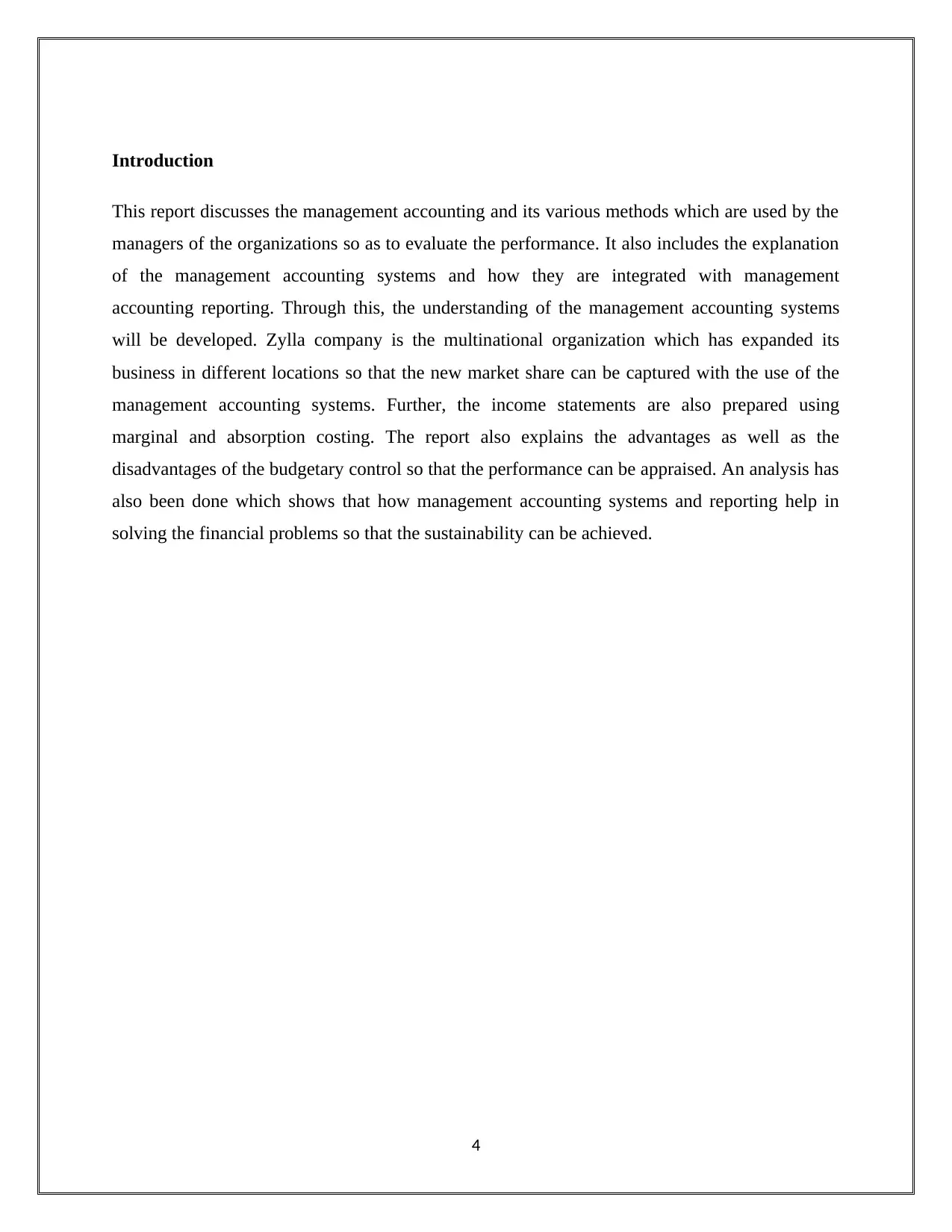
Introduction
This report discusses the management accounting and its various methods which are used by the
managers of the organizations so as to evaluate the performance. It also includes the explanation
of the management accounting systems and how they are integrated with management
accounting reporting. Through this, the understanding of the management accounting systems
will be developed. Zylla company is the multinational organization which has expanded its
business in different locations so that the new market share can be captured with the use of the
management accounting systems. Further, the income statements are also prepared using
marginal and absorption costing. The report also explains the advantages as well as the
disadvantages of the budgetary control so that the performance can be appraised. An analysis has
also been done which shows that how management accounting systems and reporting help in
solving the financial problems so that the sustainability can be achieved.
4
This report discusses the management accounting and its various methods which are used by the
managers of the organizations so as to evaluate the performance. It also includes the explanation
of the management accounting systems and how they are integrated with management
accounting reporting. Through this, the understanding of the management accounting systems
will be developed. Zylla company is the multinational organization which has expanded its
business in different locations so that the new market share can be captured with the use of the
management accounting systems. Further, the income statements are also prepared using
marginal and absorption costing. The report also explains the advantages as well as the
disadvantages of the budgetary control so that the performance can be appraised. An analysis has
also been done which shows that how management accounting systems and reporting help in
solving the financial problems so that the sustainability can be achieved.
4
Secure Best Marks with AI Grader
Need help grading? Try our AI Grader for instant feedback on your assignments.
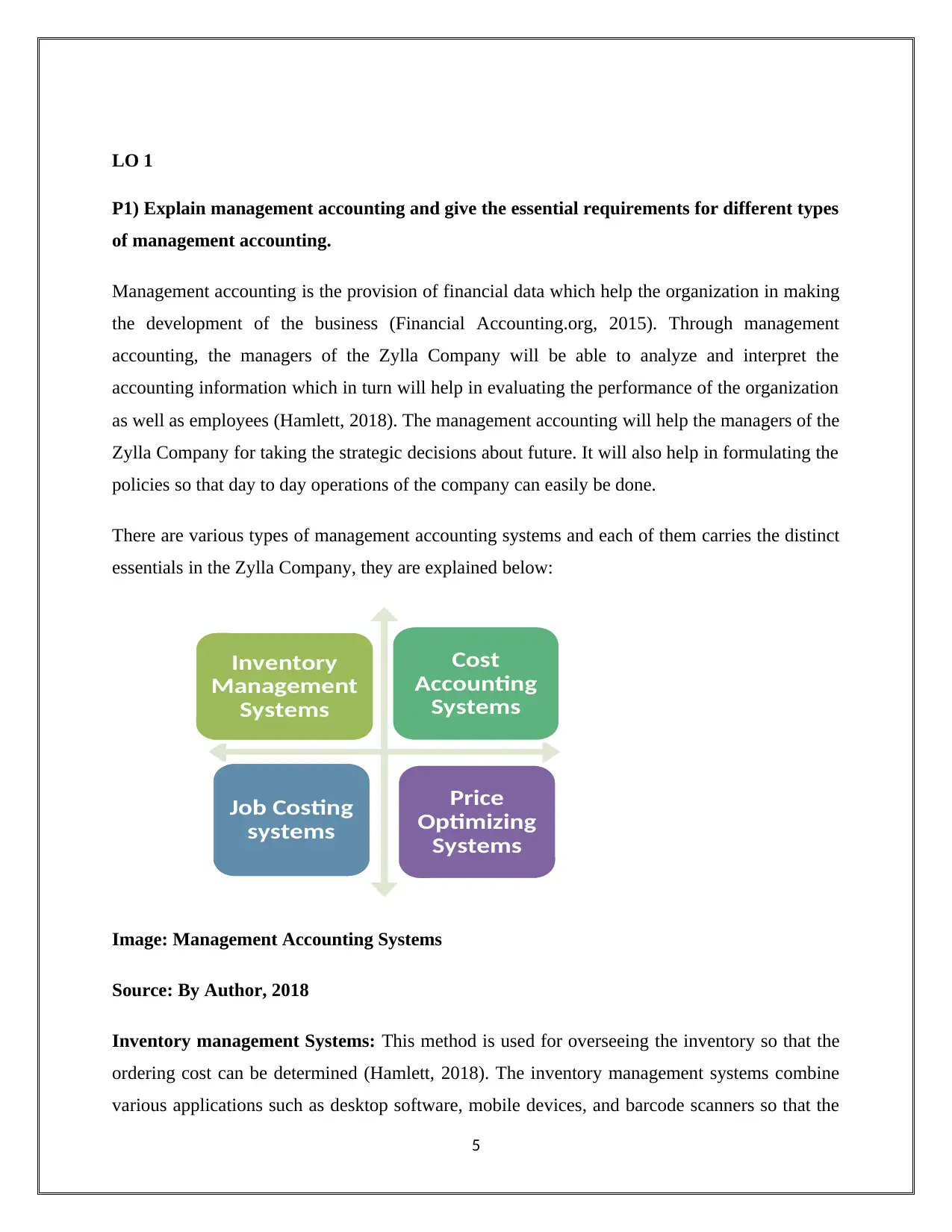
LO 1
P1) Explain management accounting and give the essential requirements for different types
of management accounting.
Management accounting is the provision of financial data which help the organization in making
the development of the business (Financial Accounting.org, 2015). Through management
accounting, the managers of the Zylla Company will be able to analyze and interpret the
accounting information which in turn will help in evaluating the performance of the organization
as well as employees (Hamlett, 2018). The management accounting will help the managers of the
Zylla Company for taking the strategic decisions about future. It will also help in formulating the
policies so that day to day operations of the company can easily be done.
There are various types of management accounting systems and each of them carries the distinct
essentials in the Zylla Company, they are explained below:
Image: Management Accounting Systems
Source: By Author, 2018
Inventory management Systems: This method is used for overseeing the inventory so that the
ordering cost can be determined (Hamlett, 2018). The inventory management systems combine
various applications such as desktop software, mobile devices, and barcode scanners so that the
5
Inventory
Management
Systems
Cost
Accounting
Systems
Job Costing
systems
Price
Optimizing
Systems
P1) Explain management accounting and give the essential requirements for different types
of management accounting.
Management accounting is the provision of financial data which help the organization in making
the development of the business (Financial Accounting.org, 2015). Through management
accounting, the managers of the Zylla Company will be able to analyze and interpret the
accounting information which in turn will help in evaluating the performance of the organization
as well as employees (Hamlett, 2018). The management accounting will help the managers of the
Zylla Company for taking the strategic decisions about future. It will also help in formulating the
policies so that day to day operations of the company can easily be done.
There are various types of management accounting systems and each of them carries the distinct
essentials in the Zylla Company, they are explained below:
Image: Management Accounting Systems
Source: By Author, 2018
Inventory management Systems: This method is used for overseeing the inventory so that the
ordering cost can be determined (Hamlett, 2018). The inventory management systems combine
various applications such as desktop software, mobile devices, and barcode scanners so that the
5
Inventory
Management
Systems
Cost
Accounting
Systems
Job Costing
systems
Price
Optimizing
Systems

inventory can be managed as suppliers, stock as well as the goods. The tracking of quantities will
enable the managers of the Zylla Company to take inventory related decisions effectively
(Hamlett, 2018).
Cost accounting Systems: These systems will determine the cost of Zylla Company’s product
so that the inventory can be evaluated, the cost can be controlled and the profitability can be
attained. This system will also help in measuring the financial performance by evaluating the
costs of input outcomes to that of the actual output (Hamlett, 2018). It is the main concept as it
offers the analytical tools such as marginal costing and absorption costing so that the
productivity can be effectively utilized.
Job Costing Systems: It is the system which allocates the cost to the individual item or the batch
of the products (Hamlett, 2018). This job costing is mainly used in the manufacturing firms
(Lister, 2018). This information is necessary as it helps in determining the accuracy of the
systems of Zylla Company which is capable of quoting prices for the reasonable income
(Hamlett, 2018).
Price Optimizing Systems: It will help Zylla Company in determining that how consumers will
react to the various prices offered for the goods as well as the services (Hamlett, 2018). It also
helps the company in determining that which price is best suited for the goods and the services
so that the gross profit can be maximized. With this, the undesired price can be minimized.
6
enable the managers of the Zylla Company to take inventory related decisions effectively
(Hamlett, 2018).
Cost accounting Systems: These systems will determine the cost of Zylla Company’s product
so that the inventory can be evaluated, the cost can be controlled and the profitability can be
attained. This system will also help in measuring the financial performance by evaluating the
costs of input outcomes to that of the actual output (Hamlett, 2018). It is the main concept as it
offers the analytical tools such as marginal costing and absorption costing so that the
productivity can be effectively utilized.
Job Costing Systems: It is the system which allocates the cost to the individual item or the batch
of the products (Hamlett, 2018). This job costing is mainly used in the manufacturing firms
(Lister, 2018). This information is necessary as it helps in determining the accuracy of the
systems of Zylla Company which is capable of quoting prices for the reasonable income
(Hamlett, 2018).
Price Optimizing Systems: It will help Zylla Company in determining that how consumers will
react to the various prices offered for the goods as well as the services (Hamlett, 2018). It also
helps the company in determining that which price is best suited for the goods and the services
so that the gross profit can be maximized. With this, the undesired price can be minimized.
6
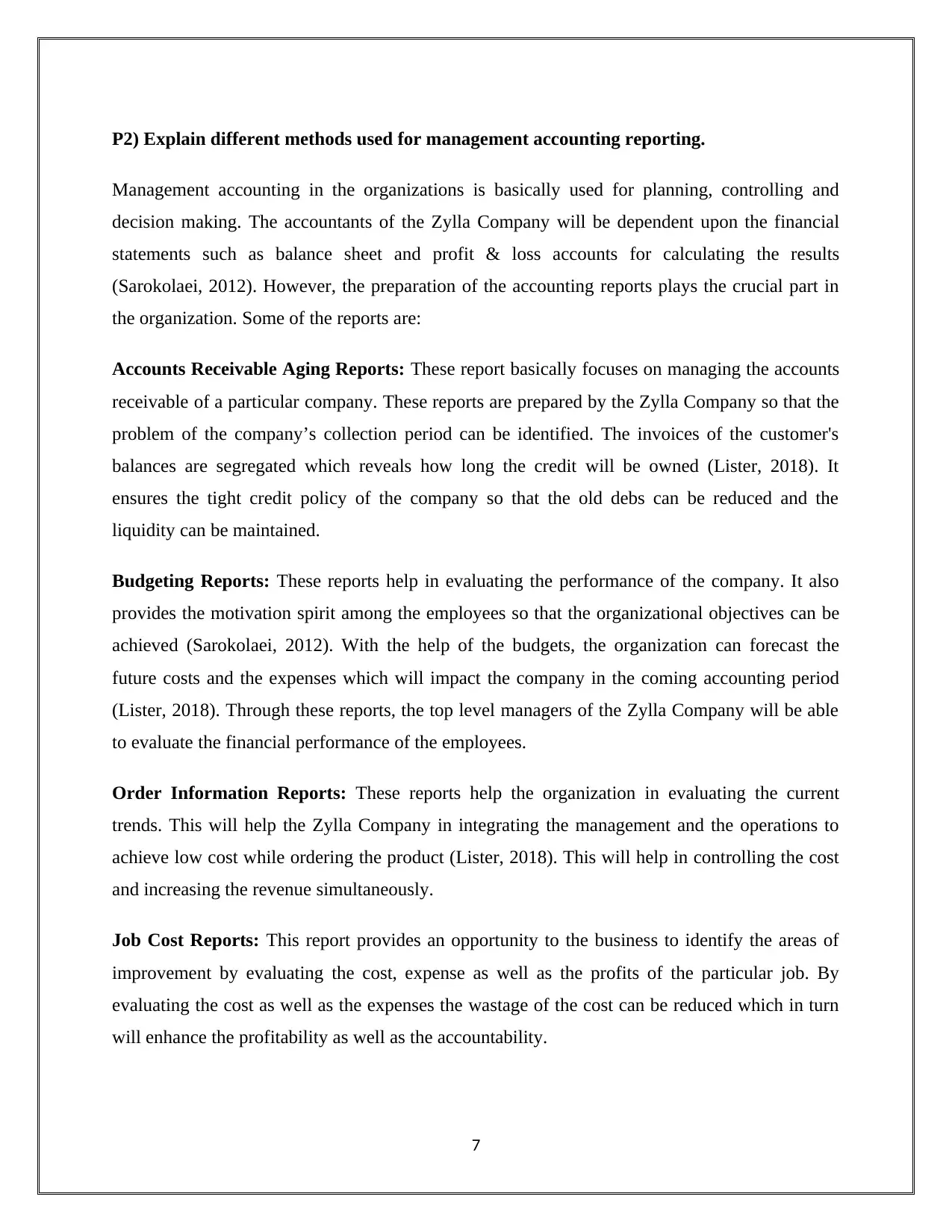
P2) Explain different methods used for management accounting reporting.
Management accounting in the organizations is basically used for planning, controlling and
decision making. The accountants of the Zylla Company will be dependent upon the financial
statements such as balance sheet and profit & loss accounts for calculating the results
(Sarokolaei, 2012). However, the preparation of the accounting reports plays the crucial part in
the organization. Some of the reports are:
Accounts Receivable Aging Reports: These report basically focuses on managing the accounts
receivable of a particular company. These reports are prepared by the Zylla Company so that the
problem of the company’s collection period can be identified. The invoices of the customer's
balances are segregated which reveals how long the credit will be owned (Lister, 2018). It
ensures the tight credit policy of the company so that the old debs can be reduced and the
liquidity can be maintained.
Budgeting Reports: These reports help in evaluating the performance of the company. It also
provides the motivation spirit among the employees so that the organizational objectives can be
achieved (Sarokolaei, 2012). With the help of the budgets, the organization can forecast the
future costs and the expenses which will impact the company in the coming accounting period
(Lister, 2018). Through these reports, the top level managers of the Zylla Company will be able
to evaluate the financial performance of the employees.
Order Information Reports: These reports help the organization in evaluating the current
trends. This will help the Zylla Company in integrating the management and the operations to
achieve low cost while ordering the product (Lister, 2018). This will help in controlling the cost
and increasing the revenue simultaneously.
Job Cost Reports: This report provides an opportunity to the business to identify the areas of
improvement by evaluating the cost, expense as well as the profits of the particular job. By
evaluating the cost as well as the expenses the wastage of the cost can be reduced which in turn
will enhance the profitability as well as the accountability.
7
Management accounting in the organizations is basically used for planning, controlling and
decision making. The accountants of the Zylla Company will be dependent upon the financial
statements such as balance sheet and profit & loss accounts for calculating the results
(Sarokolaei, 2012). However, the preparation of the accounting reports plays the crucial part in
the organization. Some of the reports are:
Accounts Receivable Aging Reports: These report basically focuses on managing the accounts
receivable of a particular company. These reports are prepared by the Zylla Company so that the
problem of the company’s collection period can be identified. The invoices of the customer's
balances are segregated which reveals how long the credit will be owned (Lister, 2018). It
ensures the tight credit policy of the company so that the old debs can be reduced and the
liquidity can be maintained.
Budgeting Reports: These reports help in evaluating the performance of the company. It also
provides the motivation spirit among the employees so that the organizational objectives can be
achieved (Sarokolaei, 2012). With the help of the budgets, the organization can forecast the
future costs and the expenses which will impact the company in the coming accounting period
(Lister, 2018). Through these reports, the top level managers of the Zylla Company will be able
to evaluate the financial performance of the employees.
Order Information Reports: These reports help the organization in evaluating the current
trends. This will help the Zylla Company in integrating the management and the operations to
achieve low cost while ordering the product (Lister, 2018). This will help in controlling the cost
and increasing the revenue simultaneously.
Job Cost Reports: This report provides an opportunity to the business to identify the areas of
improvement by evaluating the cost, expense as well as the profits of the particular job. By
evaluating the cost as well as the expenses the wastage of the cost can be reduced which in turn
will enhance the profitability as well as the accountability.
7
Paraphrase This Document
Need a fresh take? Get an instant paraphrase of this document with our AI Paraphraser
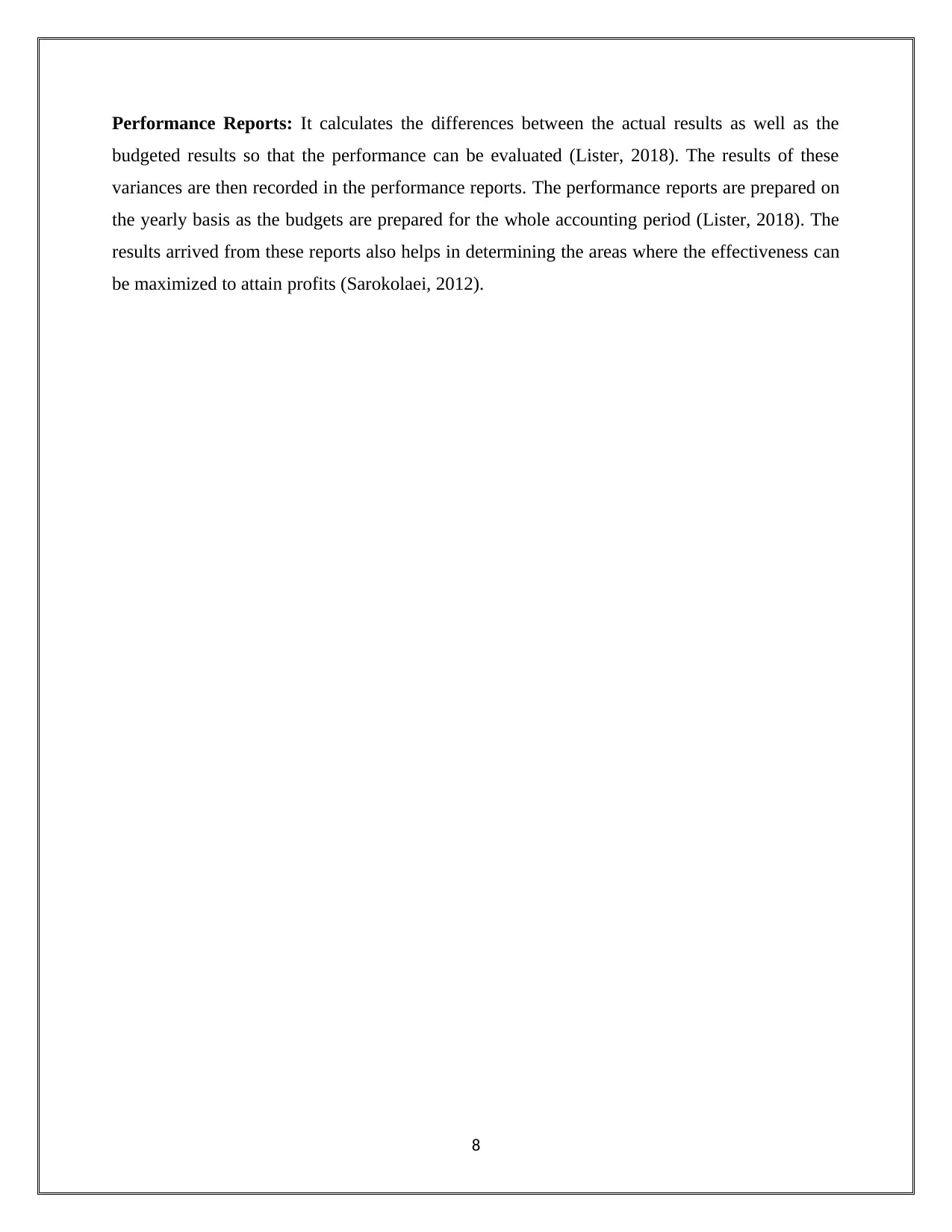
Performance Reports: It calculates the differences between the actual results as well as the
budgeted results so that the performance can be evaluated (Lister, 2018). The results of these
variances are then recorded in the performance reports. The performance reports are prepared on
the yearly basis as the budgets are prepared for the whole accounting period (Lister, 2018). The
results arrived from these reports also helps in determining the areas where the effectiveness can
be maximized to attain profits (Sarokolaei, 2012).
8
budgeted results so that the performance can be evaluated (Lister, 2018). The results of these
variances are then recorded in the performance reports. The performance reports are prepared on
the yearly basis as the budgets are prepared for the whole accounting period (Lister, 2018). The
results arrived from these reports also helps in determining the areas where the effectiveness can
be maximized to attain profits (Sarokolaei, 2012).
8

M1) Evaluate benefits of management accounting systems and their application within an
organizational context.
The application of the management accounting systems will provide various benefits to the Zylla
Company but for the ease of understanding the benefits of those systems are explained which
have been discussed earlier.
Inventory Management Systems:
The application of the inventory management systems in the Zylla Company will
improve the effectiveness as well as the productivity in the organization by saving the
time as well as money (Lister, 2018).
The accuracy of the ordering cost will be maintained.
Cost Accounting Systems:
The will be controlled cost control which in turn will help in reducing the prices of the
Zylla Company (Lister, 2018).
It also provides all the information which is necessary for planning.
Job Costing Systems:
It will help in eliminating the wastage of cost during the manufacturing process.
Through this Zylla, Company will be able to evaluate the quality of the goods produced
(Lister, 2018).
Price Optimizing Systems:
With the price optimizing system, the Zylla Company will be able to maximize the gross
profit of the organization by selecting the appropriate price.
The attitude of customers towards the various prices of the products can also be evaluated
(Lister, 2018).
9
organizational context.
The application of the management accounting systems will provide various benefits to the Zylla
Company but for the ease of understanding the benefits of those systems are explained which
have been discussed earlier.
Inventory Management Systems:
The application of the inventory management systems in the Zylla Company will
improve the effectiveness as well as the productivity in the organization by saving the
time as well as money (Lister, 2018).
The accuracy of the ordering cost will be maintained.
Cost Accounting Systems:
The will be controlled cost control which in turn will help in reducing the prices of the
Zylla Company (Lister, 2018).
It also provides all the information which is necessary for planning.
Job Costing Systems:
It will help in eliminating the wastage of cost during the manufacturing process.
Through this Zylla, Company will be able to evaluate the quality of the goods produced
(Lister, 2018).
Price Optimizing Systems:
With the price optimizing system, the Zylla Company will be able to maximize the gross
profit of the organization by selecting the appropriate price.
The attitude of customers towards the various prices of the products can also be evaluated
(Lister, 2018).
9
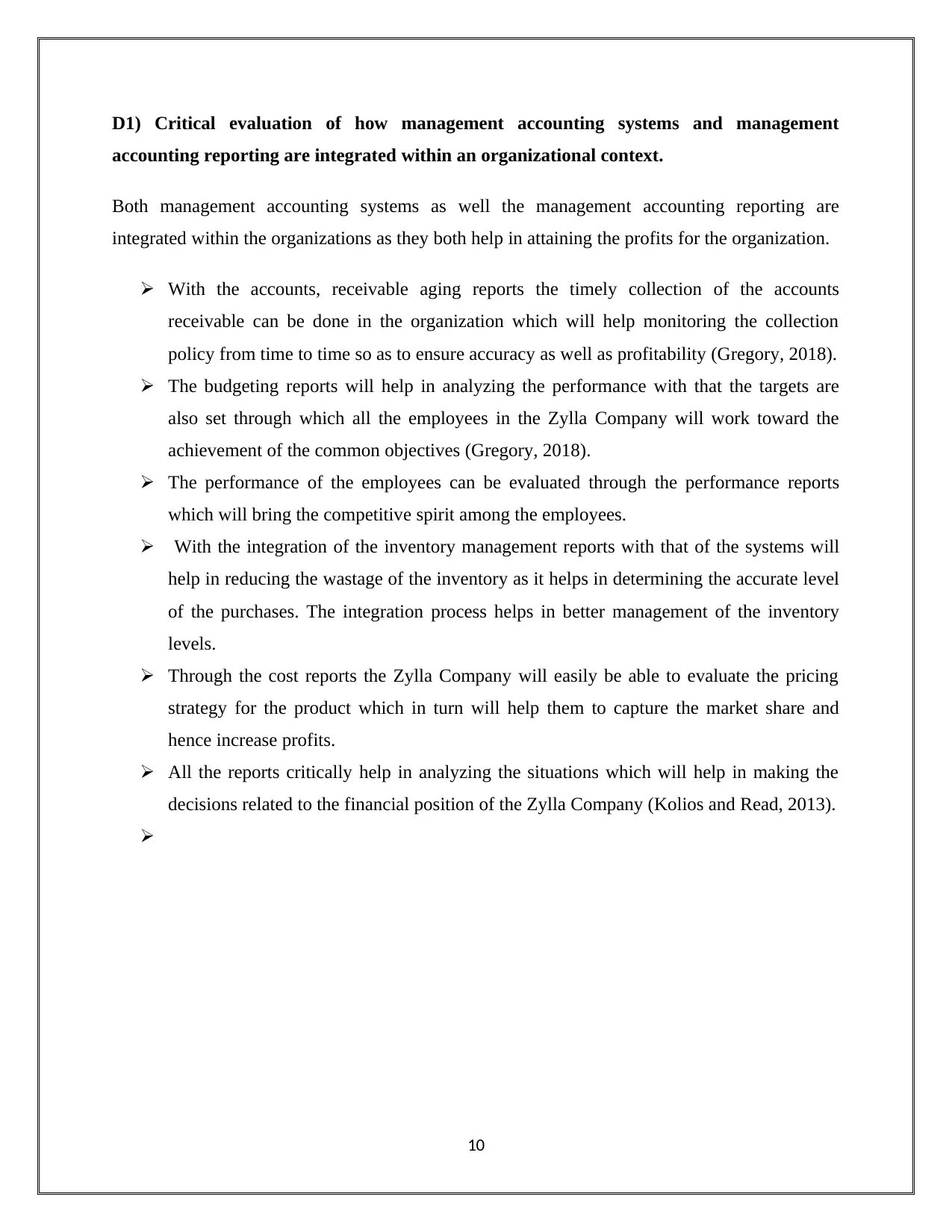
D1) Critical evaluation of how management accounting systems and management
accounting reporting are integrated within an organizational context.
Both management accounting systems as well the management accounting reporting are
integrated within the organizations as they both help in attaining the profits for the organization.
With the accounts, receivable aging reports the timely collection of the accounts
receivable can be done in the organization which will help monitoring the collection
policy from time to time so as to ensure accuracy as well as profitability (Gregory, 2018).
The budgeting reports will help in analyzing the performance with that the targets are
also set through which all the employees in the Zylla Company will work toward the
achievement of the common objectives (Gregory, 2018).
The performance of the employees can be evaluated through the performance reports
which will bring the competitive spirit among the employees.
With the integration of the inventory management reports with that of the systems will
help in reducing the wastage of the inventory as it helps in determining the accurate level
of the purchases. The integration process helps in better management of the inventory
levels.
Through the cost reports the Zylla Company will easily be able to evaluate the pricing
strategy for the product which in turn will help them to capture the market share and
hence increase profits.
All the reports critically help in analyzing the situations which will help in making the
decisions related to the financial position of the Zylla Company (Kolios and Read, 2013).
10
accounting reporting are integrated within an organizational context.
Both management accounting systems as well the management accounting reporting are
integrated within the organizations as they both help in attaining the profits for the organization.
With the accounts, receivable aging reports the timely collection of the accounts
receivable can be done in the organization which will help monitoring the collection
policy from time to time so as to ensure accuracy as well as profitability (Gregory, 2018).
The budgeting reports will help in analyzing the performance with that the targets are
also set through which all the employees in the Zylla Company will work toward the
achievement of the common objectives (Gregory, 2018).
The performance of the employees can be evaluated through the performance reports
which will bring the competitive spirit among the employees.
With the integration of the inventory management reports with that of the systems will
help in reducing the wastage of the inventory as it helps in determining the accurate level
of the purchases. The integration process helps in better management of the inventory
levels.
Through the cost reports the Zylla Company will easily be able to evaluate the pricing
strategy for the product which in turn will help them to capture the market share and
hence increase profits.
All the reports critically help in analyzing the situations which will help in making the
decisions related to the financial position of the Zylla Company (Kolios and Read, 2013).
10
Secure Best Marks with AI Grader
Need help grading? Try our AI Grader for instant feedback on your assignments.
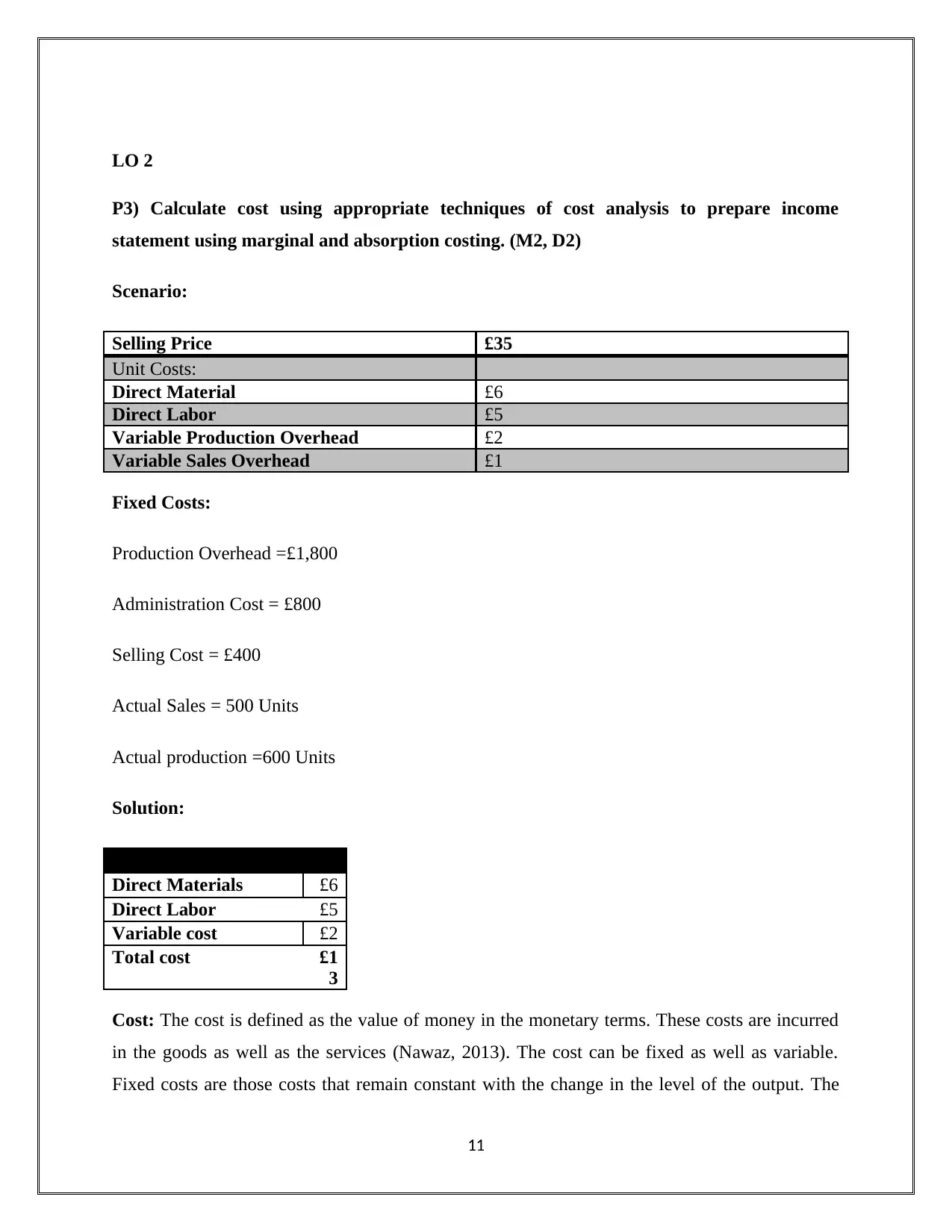
LO 2
P3) Calculate cost using appropriate techniques of cost analysis to prepare income
statement using marginal and absorption costing. (M2, D2)
Scenario:
Selling Price £35
Unit Costs:
Direct Material £6
Direct Labor £5
Variable Production Overhead £2
Variable Sales Overhead £1
Fixed Costs:
Production Overhead =£1,800
Administration Cost = £800
Selling Cost = £400
Actual Sales = 500 Units
Actual production =600 Units
Solution:
Working Notes
Direct Materials £6
Direct Labor £5
Variable cost £2
Total cost £1
3
Cost: The cost is defined as the value of money in the monetary terms. These costs are incurred
in the goods as well as the services (Nawaz, 2013). The cost can be fixed as well as variable.
Fixed costs are those costs that remain constant with the change in the level of the output. The
11
P3) Calculate cost using appropriate techniques of cost analysis to prepare income
statement using marginal and absorption costing. (M2, D2)
Scenario:
Selling Price £35
Unit Costs:
Direct Material £6
Direct Labor £5
Variable Production Overhead £2
Variable Sales Overhead £1
Fixed Costs:
Production Overhead =£1,800
Administration Cost = £800
Selling Cost = £400
Actual Sales = 500 Units
Actual production =600 Units
Solution:
Working Notes
Direct Materials £6
Direct Labor £5
Variable cost £2
Total cost £1
3
Cost: The cost is defined as the value of money in the monetary terms. These costs are incurred
in the goods as well as the services (Nawaz, 2013). The cost can be fixed as well as variable.
Fixed costs are those costs that remain constant with the change in the level of the output. The
11
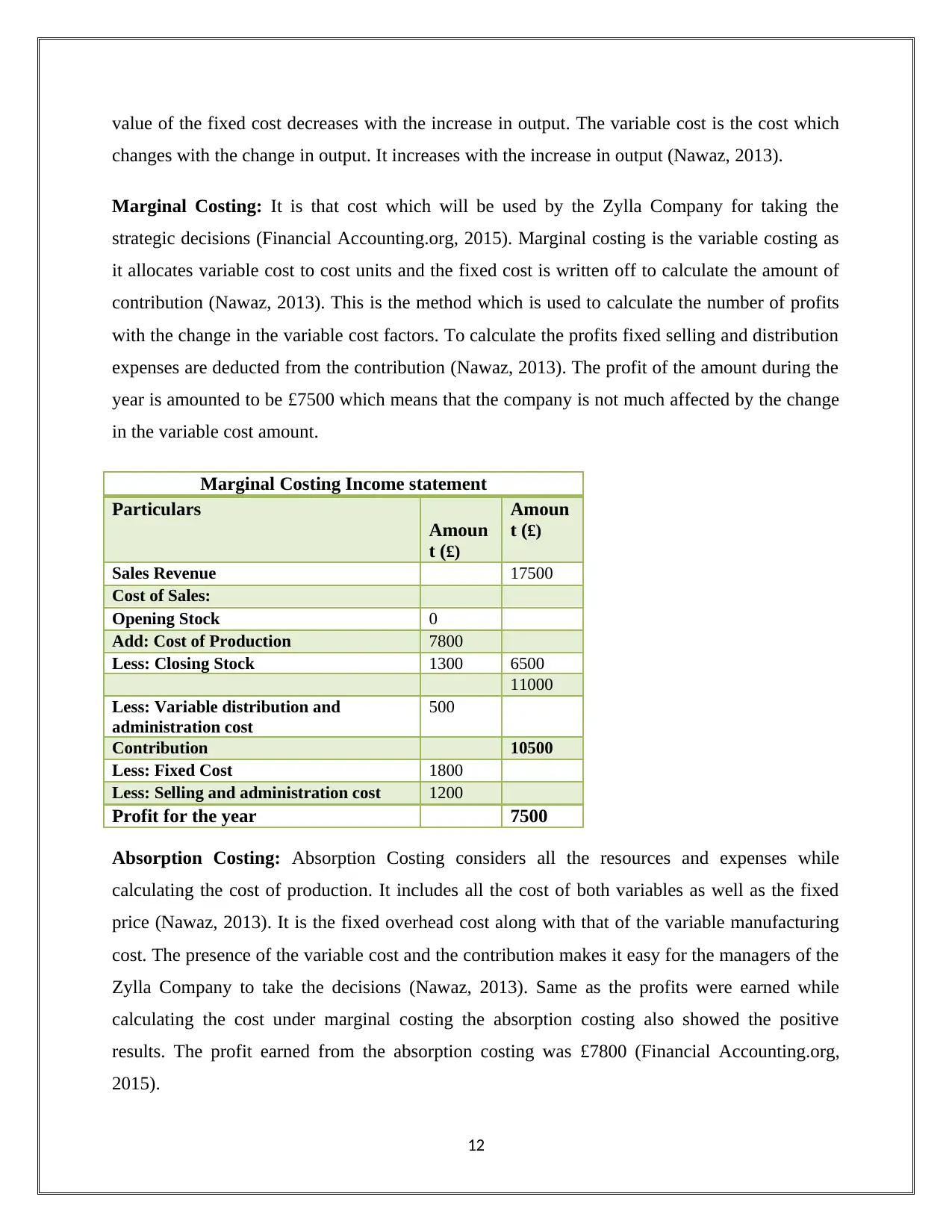
value of the fixed cost decreases with the increase in output. The variable cost is the cost which
changes with the change in output. It increases with the increase in output (Nawaz, 2013).
Marginal Costing: It is that cost which will be used by the Zylla Company for taking the
strategic decisions (Financial Accounting.org, 2015). Marginal costing is the variable costing as
it allocates variable cost to cost units and the fixed cost is written off to calculate the amount of
contribution (Nawaz, 2013). This is the method which is used to calculate the number of profits
with the change in the variable cost factors. To calculate the profits fixed selling and distribution
expenses are deducted from the contribution (Nawaz, 2013). The profit of the amount during the
year is amounted to be £7500 which means that the company is not much affected by the change
in the variable cost amount.
Marginal Costing Income statement
Particulars
Amoun
t (£)
Amoun
t (£)
Sales Revenue 17500
Cost of Sales:
Opening Stock 0
Add: Cost of Production 7800
Less: Closing Stock 1300 6500
11000
Less: Variable distribution and
administration cost
500
Contribution 10500
Less: Fixed Cost 1800
Less: Selling and administration cost 1200
Profit for the year 7500
Absorption Costing: Absorption Costing considers all the resources and expenses while
calculating the cost of production. It includes all the cost of both variables as well as the fixed
price (Nawaz, 2013). It is the fixed overhead cost along with that of the variable manufacturing
cost. The presence of the variable cost and the contribution makes it easy for the managers of the
Zylla Company to take the decisions (Nawaz, 2013). Same as the profits were earned while
calculating the cost under marginal costing the absorption costing also showed the positive
results. The profit earned from the absorption costing was £7800 (Financial Accounting.org,
2015).
12
changes with the change in output. It increases with the increase in output (Nawaz, 2013).
Marginal Costing: It is that cost which will be used by the Zylla Company for taking the
strategic decisions (Financial Accounting.org, 2015). Marginal costing is the variable costing as
it allocates variable cost to cost units and the fixed cost is written off to calculate the amount of
contribution (Nawaz, 2013). This is the method which is used to calculate the number of profits
with the change in the variable cost factors. To calculate the profits fixed selling and distribution
expenses are deducted from the contribution (Nawaz, 2013). The profit of the amount during the
year is amounted to be £7500 which means that the company is not much affected by the change
in the variable cost amount.
Marginal Costing Income statement
Particulars
Amoun
t (£)
Amoun
t (£)
Sales Revenue 17500
Cost of Sales:
Opening Stock 0
Add: Cost of Production 7800
Less: Closing Stock 1300 6500
11000
Less: Variable distribution and
administration cost
500
Contribution 10500
Less: Fixed Cost 1800
Less: Selling and administration cost 1200
Profit for the year 7500
Absorption Costing: Absorption Costing considers all the resources and expenses while
calculating the cost of production. It includes all the cost of both variables as well as the fixed
price (Nawaz, 2013). It is the fixed overhead cost along with that of the variable manufacturing
cost. The presence of the variable cost and the contribution makes it easy for the managers of the
Zylla Company to take the decisions (Nawaz, 2013). Same as the profits were earned while
calculating the cost under marginal costing the absorption costing also showed the positive
results. The profit earned from the absorption costing was £7800 (Financial Accounting.org,
2015).
12
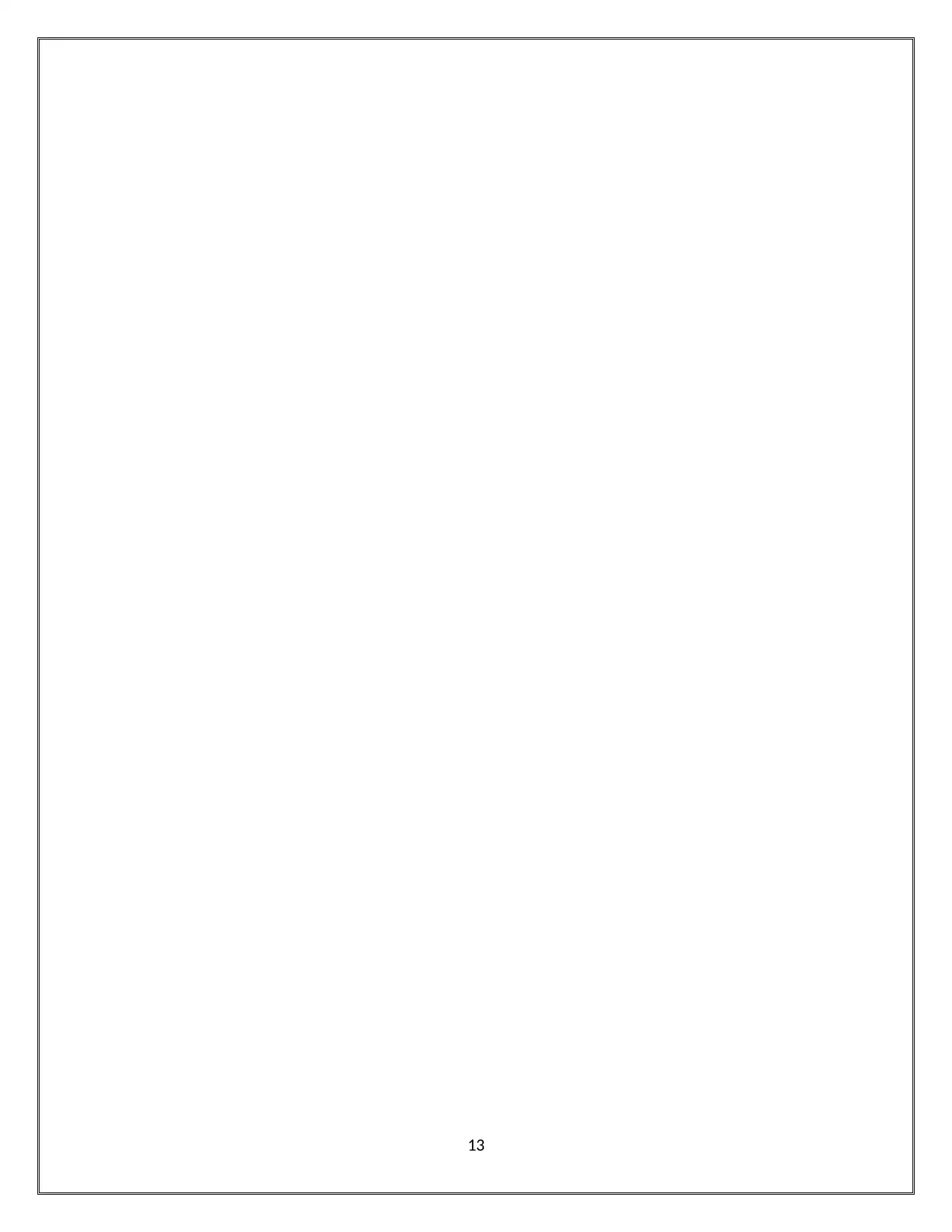
13
Paraphrase This Document
Need a fresh take? Get an instant paraphrase of this document with our AI Paraphraser
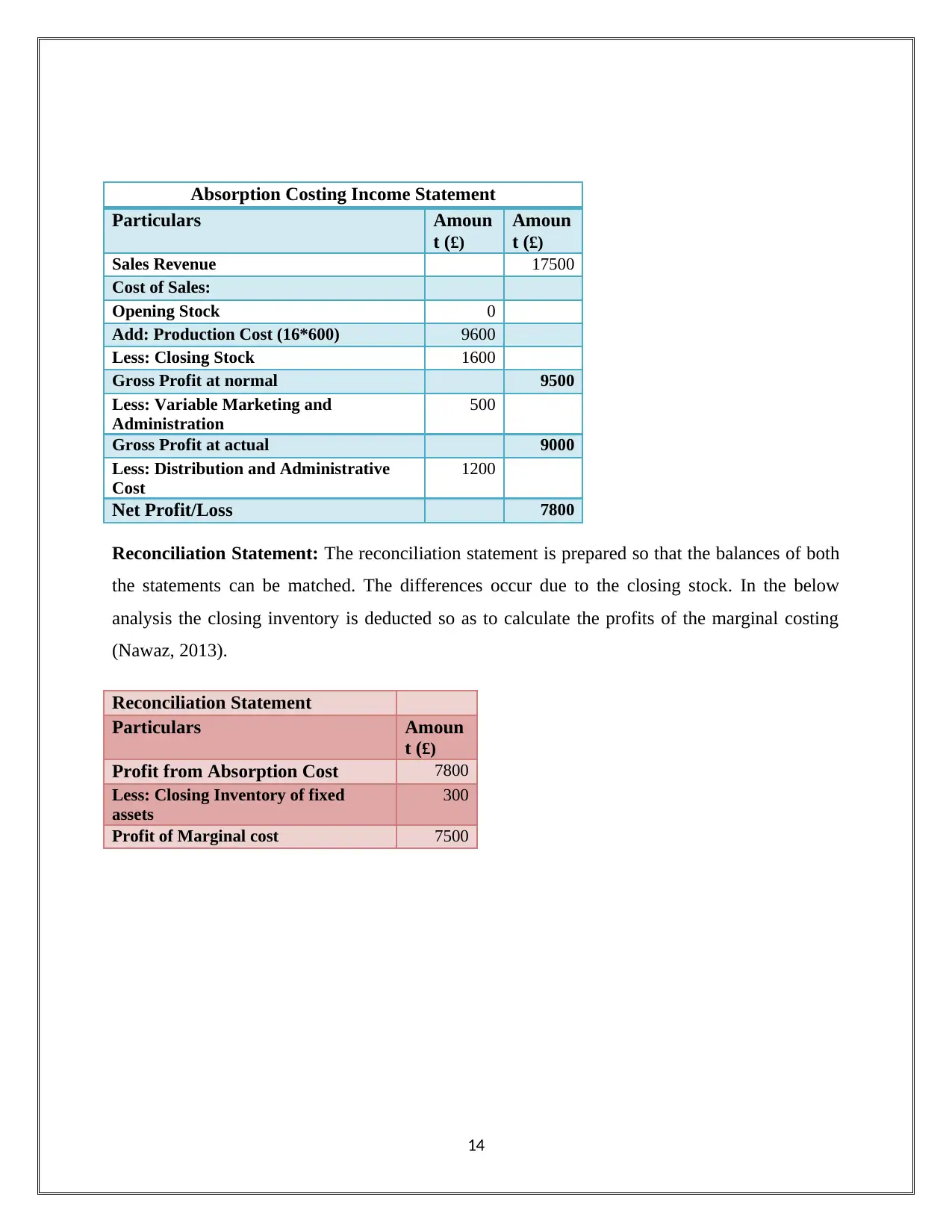
Absorption Costing Income Statement
Particulars Amoun
t (£)
Amoun
t (£)
Sales Revenue 17500
Cost of Sales:
Opening Stock 0
Add: Production Cost (16*600) 9600
Less: Closing Stock 1600
Gross Profit at normal 9500
Less: Variable Marketing and
Administration
500
Gross Profit at actual 9000
Less: Distribution and Administrative
Cost
1200
Net Profit/Loss 7800
Reconciliation Statement: The reconciliation statement is prepared so that the balances of both
the statements can be matched. The differences occur due to the closing stock. In the below
analysis the closing inventory is deducted so as to calculate the profits of the marginal costing
(Nawaz, 2013).
Reconciliation Statement
Particulars Amoun
t (£)
Profit from Absorption Cost 7800
Less: Closing Inventory of fixed
assets
300
Profit of Marginal cost 7500
14
Particulars Amoun
t (£)
Amoun
t (£)
Sales Revenue 17500
Cost of Sales:
Opening Stock 0
Add: Production Cost (16*600) 9600
Less: Closing Stock 1600
Gross Profit at normal 9500
Less: Variable Marketing and
Administration
500
Gross Profit at actual 9000
Less: Distribution and Administrative
Cost
1200
Net Profit/Loss 7800
Reconciliation Statement: The reconciliation statement is prepared so that the balances of both
the statements can be matched. The differences occur due to the closing stock. In the below
analysis the closing inventory is deducted so as to calculate the profits of the marginal costing
(Nawaz, 2013).
Reconciliation Statement
Particulars Amoun
t (£)
Profit from Absorption Cost 7800
Less: Closing Inventory of fixed
assets
300
Profit of Marginal cost 7500
14
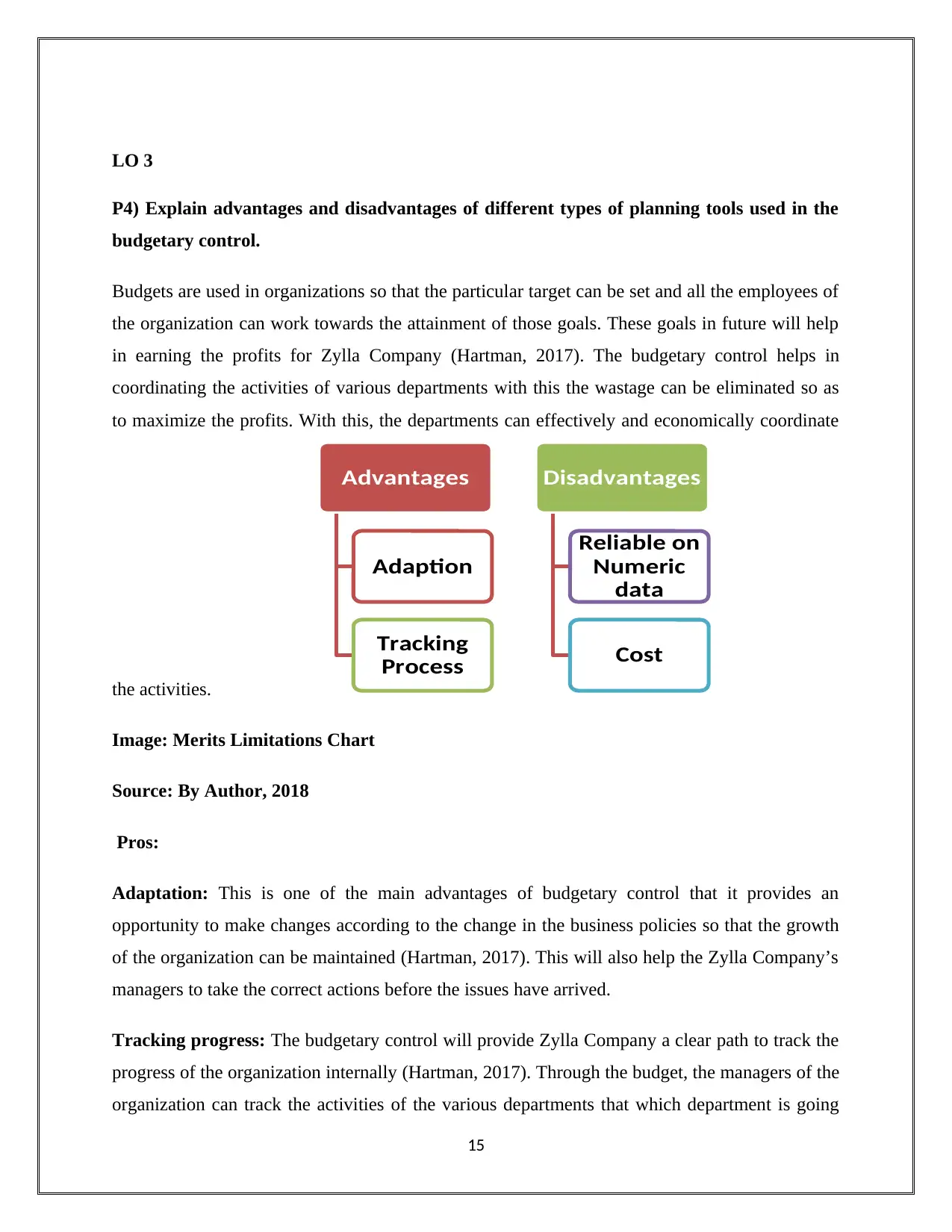
LO 3
P4) Explain advantages and disadvantages of different types of planning tools used in the
budgetary control.
Budgets are used in organizations so that the particular target can be set and all the employees of
the organization can work towards the attainment of those goals. These goals in future will help
in earning the profits for Zylla Company (Hartman, 2017). The budgetary control helps in
coordinating the activities of various departments with this the wastage can be eliminated so as
to maximize the profits. With this, the departments can effectively and economically coordinate
the activities.
Image: Merits Limitations Chart
Source: By Author, 2018
Pros:
Adaptation: This is one of the main advantages of budgetary control that it provides an
opportunity to make changes according to the change in the business policies so that the growth
of the organization can be maintained (Hartman, 2017). This will also help the Zylla Company’s
managers to take the correct actions before the issues have arrived.
Tracking progress: The budgetary control will provide Zylla Company a clear path to track the
progress of the organization internally (Hartman, 2017). Through the budget, the managers of the
organization can track the activities of the various departments that which department is going
15
Advantages
Adaption
Tracking
Process
Disadvantages
Reliable on
Numeric
data
Cost
P4) Explain advantages and disadvantages of different types of planning tools used in the
budgetary control.
Budgets are used in organizations so that the particular target can be set and all the employees of
the organization can work towards the attainment of those goals. These goals in future will help
in earning the profits for Zylla Company (Hartman, 2017). The budgetary control helps in
coordinating the activities of various departments with this the wastage can be eliminated so as
to maximize the profits. With this, the departments can effectively and economically coordinate
the activities.
Image: Merits Limitations Chart
Source: By Author, 2018
Pros:
Adaptation: This is one of the main advantages of budgetary control that it provides an
opportunity to make changes according to the change in the business policies so that the growth
of the organization can be maintained (Hartman, 2017). This will also help the Zylla Company’s
managers to take the correct actions before the issues have arrived.
Tracking progress: The budgetary control will provide Zylla Company a clear path to track the
progress of the organization internally (Hartman, 2017). Through the budget, the managers of the
organization can track the activities of the various departments that which department is going
15
Advantages
Adaption
Tracking
Process
Disadvantages
Reliable on
Numeric
data
Cost
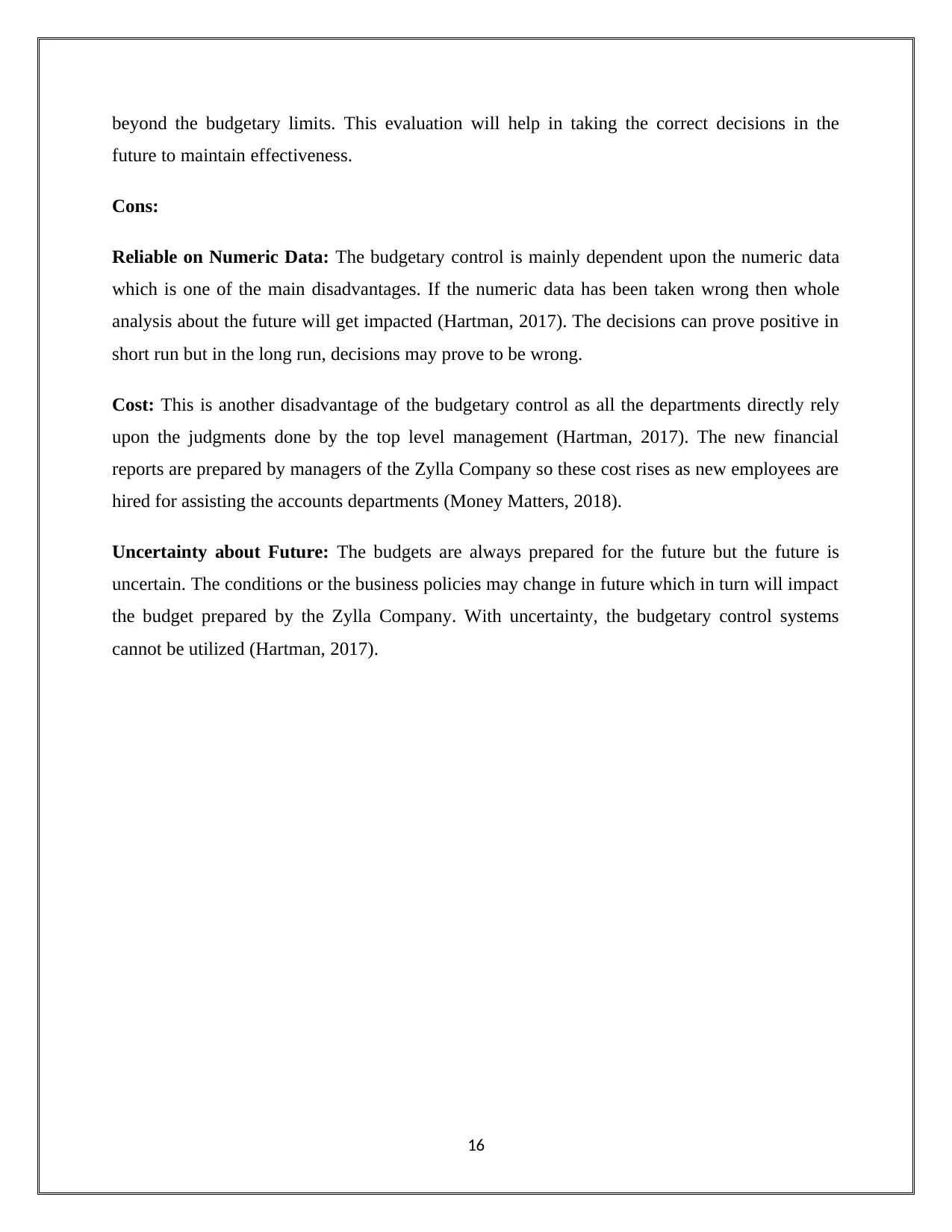
beyond the budgetary limits. This evaluation will help in taking the correct decisions in the
future to maintain effectiveness.
Cons:
Reliable on Numeric Data: The budgetary control is mainly dependent upon the numeric data
which is one of the main disadvantages. If the numeric data has been taken wrong then whole
analysis about the future will get impacted (Hartman, 2017). The decisions can prove positive in
short run but in the long run, decisions may prove to be wrong.
Cost: This is another disadvantage of the budgetary control as all the departments directly rely
upon the judgments done by the top level management (Hartman, 2017). The new financial
reports are prepared by managers of the Zylla Company so these cost rises as new employees are
hired for assisting the accounts departments (Money Matters, 2018).
Uncertainty about Future: The budgets are always prepared for the future but the future is
uncertain. The conditions or the business policies may change in future which in turn will impact
the budget prepared by the Zylla Company. With uncertainty, the budgetary control systems
cannot be utilized (Hartman, 2017).
16
future to maintain effectiveness.
Cons:
Reliable on Numeric Data: The budgetary control is mainly dependent upon the numeric data
which is one of the main disadvantages. If the numeric data has been taken wrong then whole
analysis about the future will get impacted (Hartman, 2017). The decisions can prove positive in
short run but in the long run, decisions may prove to be wrong.
Cost: This is another disadvantage of the budgetary control as all the departments directly rely
upon the judgments done by the top level management (Hartman, 2017). The new financial
reports are prepared by managers of the Zylla Company so these cost rises as new employees are
hired for assisting the accounts departments (Money Matters, 2018).
Uncertainty about Future: The budgets are always prepared for the future but the future is
uncertain. The conditions or the business policies may change in future which in turn will impact
the budget prepared by the Zylla Company. With uncertainty, the budgetary control systems
cannot be utilized (Hartman, 2017).
16
Secure Best Marks with AI Grader
Need help grading? Try our AI Grader for instant feedback on your assignments.
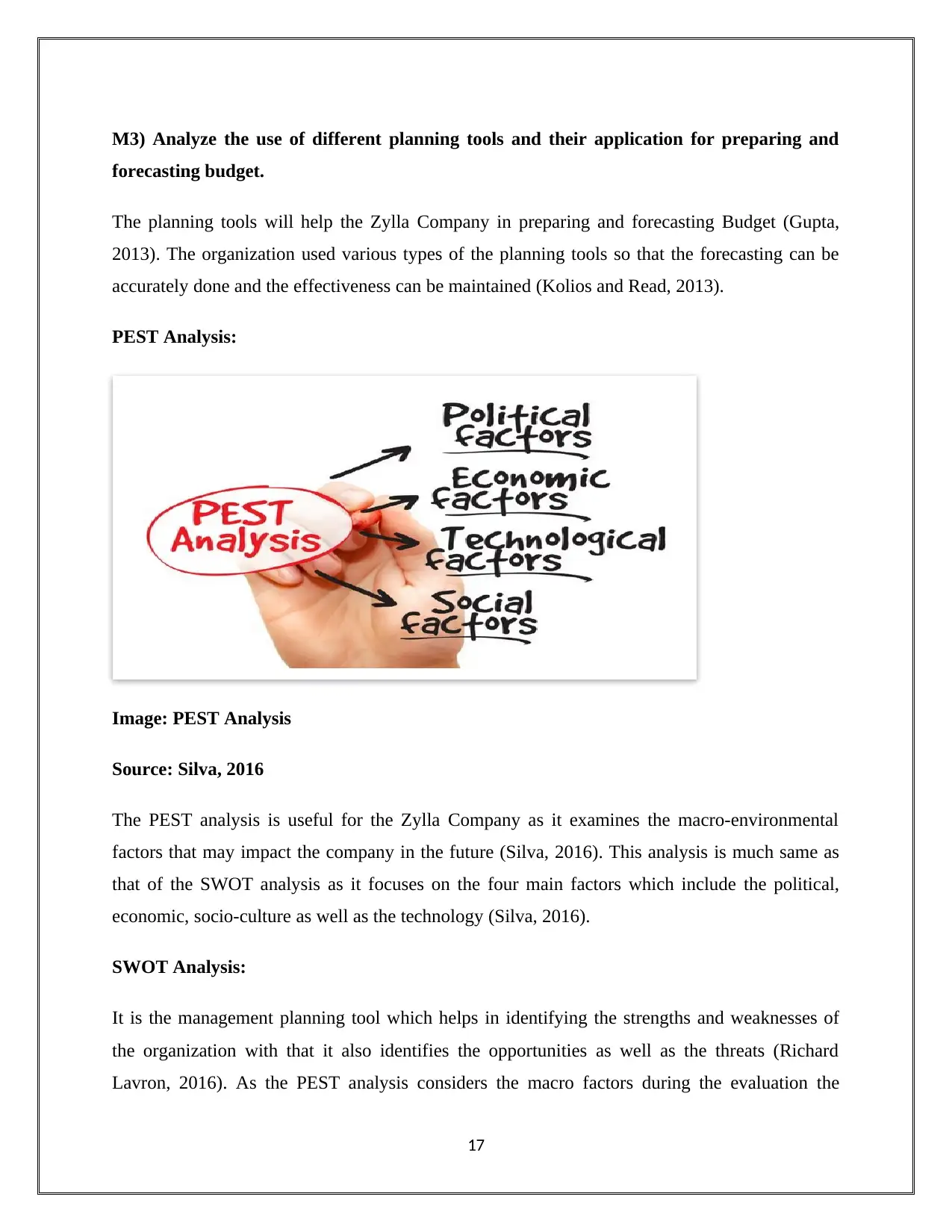
M3) Analyze the use of different planning tools and their application for preparing and
forecasting budget.
The planning tools will help the Zylla Company in preparing and forecasting Budget (Gupta,
2013). The organization used various types of the planning tools so that the forecasting can be
accurately done and the effectiveness can be maintained (Kolios and Read, 2013).
PEST Analysis:
Image: PEST Analysis
Source: Silva, 2016
The PEST analysis is useful for the Zylla Company as it examines the macro-environmental
factors that may impact the company in the future (Silva, 2016). This analysis is much same as
that of the SWOT analysis as it focuses on the four main factors which include the political,
economic, socio-culture as well as the technology (Silva, 2016).
SWOT Analysis:
It is the management planning tool which helps in identifying the strengths and weaknesses of
the organization with that it also identifies the opportunities as well as the threats (Richard
Lavron, 2016). As the PEST analysis considers the macro factors during the evaluation the
17
forecasting budget.
The planning tools will help the Zylla Company in preparing and forecasting Budget (Gupta,
2013). The organization used various types of the planning tools so that the forecasting can be
accurately done and the effectiveness can be maintained (Kolios and Read, 2013).
PEST Analysis:
Image: PEST Analysis
Source: Silva, 2016
The PEST analysis is useful for the Zylla Company as it examines the macro-environmental
factors that may impact the company in the future (Silva, 2016). This analysis is much same as
that of the SWOT analysis as it focuses on the four main factors which include the political,
economic, socio-culture as well as the technology (Silva, 2016).
SWOT Analysis:
It is the management planning tool which helps in identifying the strengths and weaknesses of
the organization with that it also identifies the opportunities as well as the threats (Richard
Lavron, 2016). As the PEST analysis considers the macro factors during the evaluation the
17
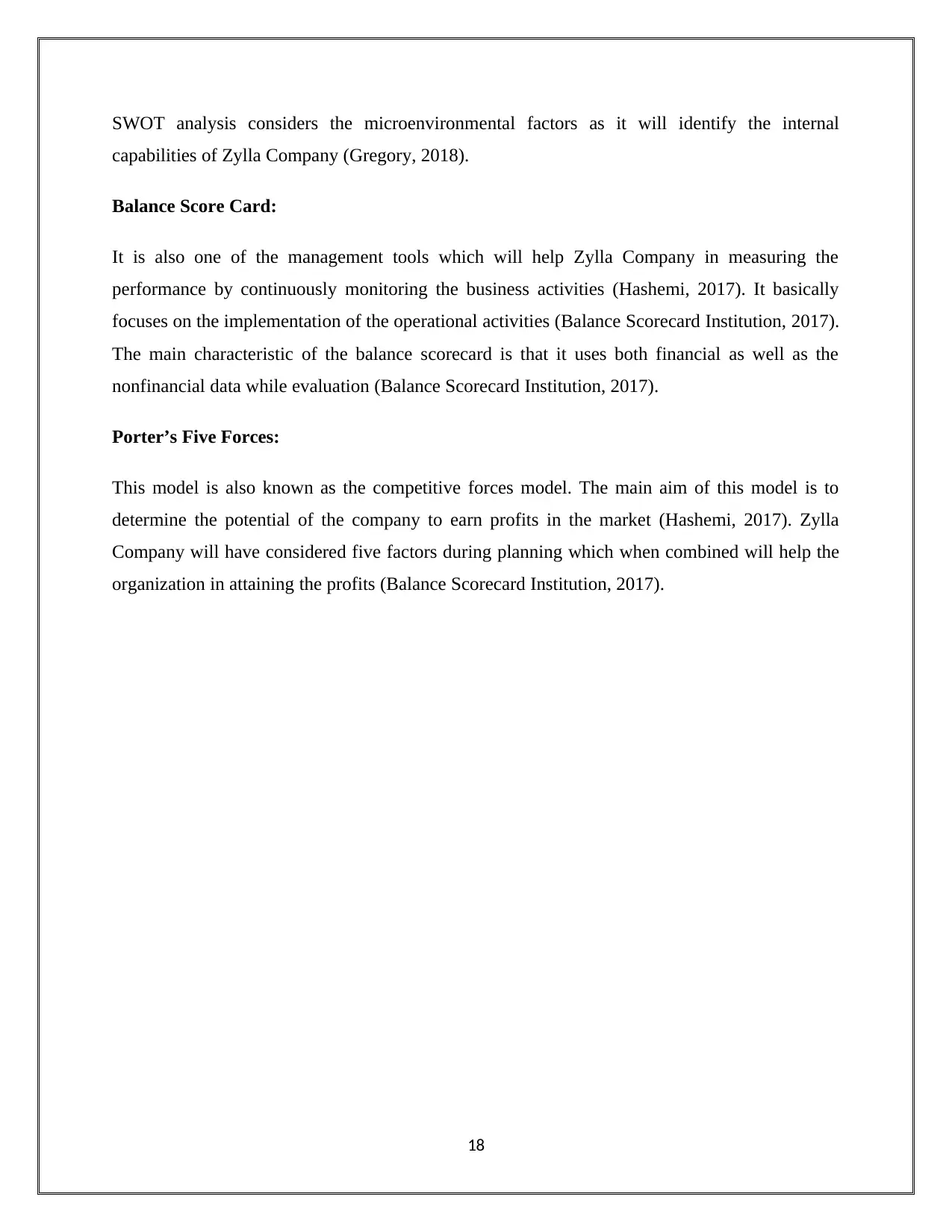
SWOT analysis considers the microenvironmental factors as it will identify the internal
capabilities of Zylla Company (Gregory, 2018).
Balance Score Card:
It is also one of the management tools which will help Zylla Company in measuring the
performance by continuously monitoring the business activities (Hashemi, 2017). It basically
focuses on the implementation of the operational activities (Balance Scorecard Institution, 2017).
The main characteristic of the balance scorecard is that it uses both financial as well as the
nonfinancial data while evaluation (Balance Scorecard Institution, 2017).
Porter’s Five Forces:
This model is also known as the competitive forces model. The main aim of this model is to
determine the potential of the company to earn profits in the market (Hashemi, 2017). Zylla
Company will have considered five factors during planning which when combined will help the
organization in attaining the profits (Balance Scorecard Institution, 2017).
18
capabilities of Zylla Company (Gregory, 2018).
Balance Score Card:
It is also one of the management tools which will help Zylla Company in measuring the
performance by continuously monitoring the business activities (Hashemi, 2017). It basically
focuses on the implementation of the operational activities (Balance Scorecard Institution, 2017).
The main characteristic of the balance scorecard is that it uses both financial as well as the
nonfinancial data while evaluation (Balance Scorecard Institution, 2017).
Porter’s Five Forces:
This model is also known as the competitive forces model. The main aim of this model is to
determine the potential of the company to earn profits in the market (Hashemi, 2017). Zylla
Company will have considered five factors during planning which when combined will help the
organization in attaining the profits (Balance Scorecard Institution, 2017).
18
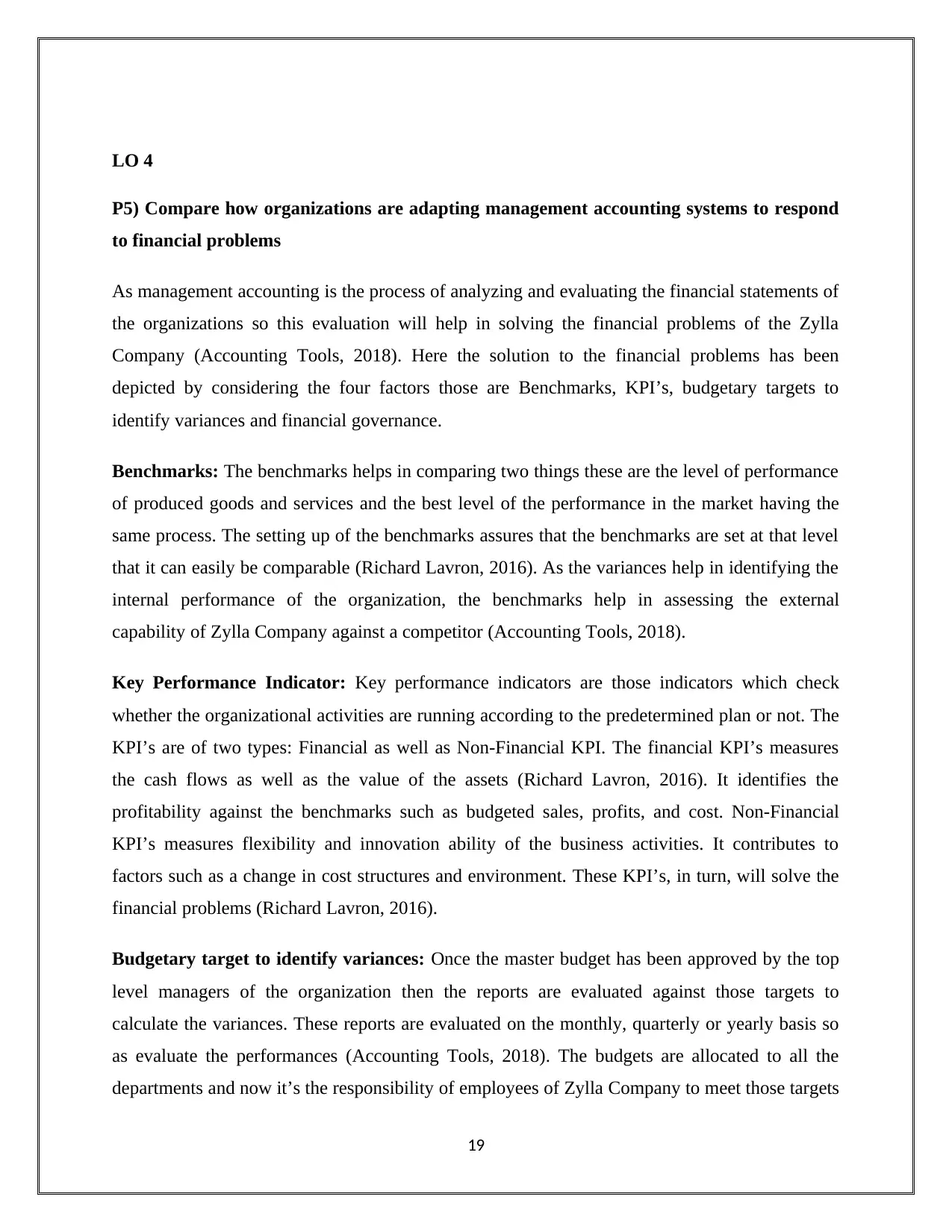
LO 4
P5) Compare how organizations are adapting management accounting systems to respond
to financial problems
As management accounting is the process of analyzing and evaluating the financial statements of
the organizations so this evaluation will help in solving the financial problems of the Zylla
Company (Accounting Tools, 2018). Here the solution to the financial problems has been
depicted by considering the four factors those are Benchmarks, KPI’s, budgetary targets to
identify variances and financial governance.
Benchmarks: The benchmarks helps in comparing two things these are the level of performance
of produced goods and services and the best level of the performance in the market having the
same process. The setting up of the benchmarks assures that the benchmarks are set at that level
that it can easily be comparable (Richard Lavron, 2016). As the variances help in identifying the
internal performance of the organization, the benchmarks help in assessing the external
capability of Zylla Company against a competitor (Accounting Tools, 2018).
Key Performance Indicator: Key performance indicators are those indicators which check
whether the organizational activities are running according to the predetermined plan or not. The
KPI’s are of two types: Financial as well as Non-Financial KPI. The financial KPI’s measures
the cash flows as well as the value of the assets (Richard Lavron, 2016). It identifies the
profitability against the benchmarks such as budgeted sales, profits, and cost. Non-Financial
KPI’s measures flexibility and innovation ability of the business activities. It contributes to
factors such as a change in cost structures and environment. These KPI’s, in turn, will solve the
financial problems (Richard Lavron, 2016).
Budgetary target to identify variances: Once the master budget has been approved by the top
level managers of the organization then the reports are evaluated against those targets to
calculate the variances. These reports are evaluated on the monthly, quarterly or yearly basis so
as evaluate the performances (Accounting Tools, 2018). The budgets are allocated to all the
departments and now it’s the responsibility of employees of Zylla Company to meet those targets
19
P5) Compare how organizations are adapting management accounting systems to respond
to financial problems
As management accounting is the process of analyzing and evaluating the financial statements of
the organizations so this evaluation will help in solving the financial problems of the Zylla
Company (Accounting Tools, 2018). Here the solution to the financial problems has been
depicted by considering the four factors those are Benchmarks, KPI’s, budgetary targets to
identify variances and financial governance.
Benchmarks: The benchmarks helps in comparing two things these are the level of performance
of produced goods and services and the best level of the performance in the market having the
same process. The setting up of the benchmarks assures that the benchmarks are set at that level
that it can easily be comparable (Richard Lavron, 2016). As the variances help in identifying the
internal performance of the organization, the benchmarks help in assessing the external
capability of Zylla Company against a competitor (Accounting Tools, 2018).
Key Performance Indicator: Key performance indicators are those indicators which check
whether the organizational activities are running according to the predetermined plan or not. The
KPI’s are of two types: Financial as well as Non-Financial KPI. The financial KPI’s measures
the cash flows as well as the value of the assets (Richard Lavron, 2016). It identifies the
profitability against the benchmarks such as budgeted sales, profits, and cost. Non-Financial
KPI’s measures flexibility and innovation ability of the business activities. It contributes to
factors such as a change in cost structures and environment. These KPI’s, in turn, will solve the
financial problems (Richard Lavron, 2016).
Budgetary target to identify variances: Once the master budget has been approved by the top
level managers of the organization then the reports are evaluated against those targets to
calculate the variances. These reports are evaluated on the monthly, quarterly or yearly basis so
as evaluate the performances (Accounting Tools, 2018). The budgets are allocated to all the
departments and now it’s the responsibility of employees of Zylla Company to meet those targets
19
Paraphrase This Document
Need a fresh take? Get an instant paraphrase of this document with our AI Paraphraser
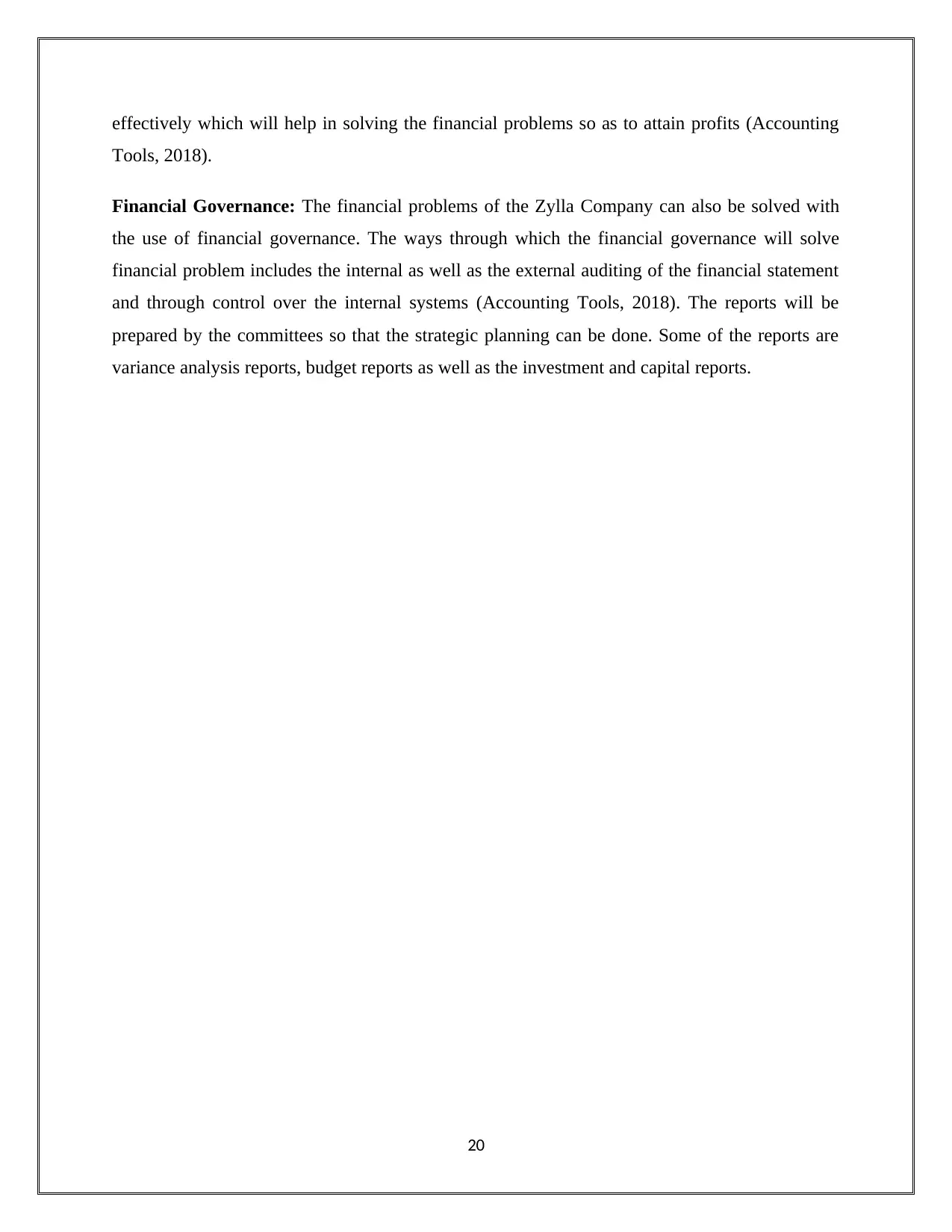
effectively which will help in solving the financial problems so as to attain profits (Accounting
Tools, 2018).
Financial Governance: The financial problems of the Zylla Company can also be solved with
the use of financial governance. The ways through which the financial governance will solve
financial problem includes the internal as well as the external auditing of the financial statement
and through control over the internal systems (Accounting Tools, 2018). The reports will be
prepared by the committees so that the strategic planning can be done. Some of the reports are
variance analysis reports, budget reports as well as the investment and capital reports.
20
Tools, 2018).
Financial Governance: The financial problems of the Zylla Company can also be solved with
the use of financial governance. The ways through which the financial governance will solve
financial problem includes the internal as well as the external auditing of the financial statement
and through control over the internal systems (Accounting Tools, 2018). The reports will be
prepared by the committees so that the strategic planning can be done. Some of the reports are
variance analysis reports, budget reports as well as the investment and capital reports.
20
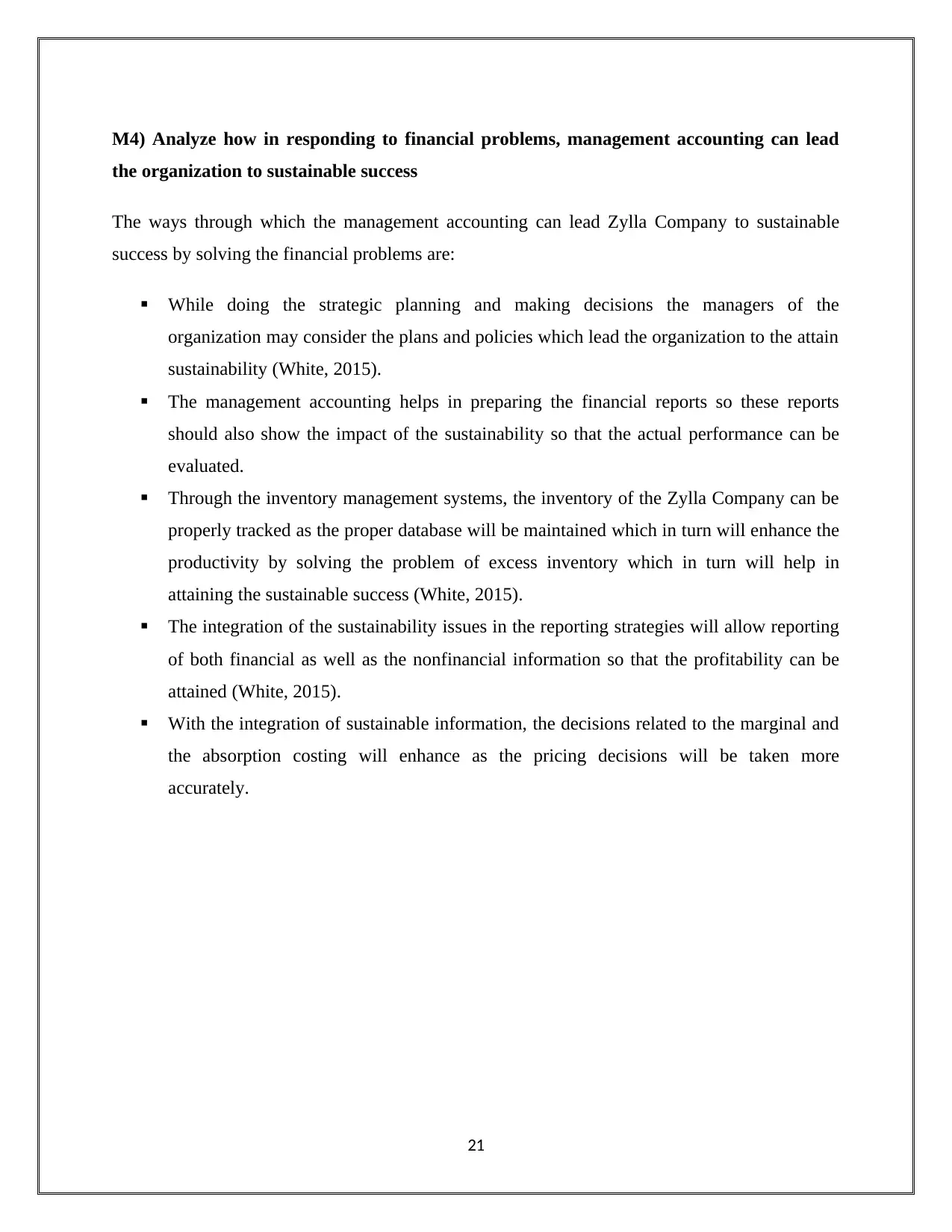
M4) Analyze how in responding to financial problems, management accounting can lead
the organization to sustainable success
The ways through which the management accounting can lead Zylla Company to sustainable
success by solving the financial problems are:
While doing the strategic planning and making decisions the managers of the
organization may consider the plans and policies which lead the organization to the attain
sustainability (White, 2015).
The management accounting helps in preparing the financial reports so these reports
should also show the impact of the sustainability so that the actual performance can be
evaluated.
Through the inventory management systems, the inventory of the Zylla Company can be
properly tracked as the proper database will be maintained which in turn will enhance the
productivity by solving the problem of excess inventory which in turn will help in
attaining the sustainable success (White, 2015).
The integration of the sustainability issues in the reporting strategies will allow reporting
of both financial as well as the nonfinancial information so that the profitability can be
attained (White, 2015).
With the integration of sustainable information, the decisions related to the marginal and
the absorption costing will enhance as the pricing decisions will be taken more
accurately.
21
the organization to sustainable success
The ways through which the management accounting can lead Zylla Company to sustainable
success by solving the financial problems are:
While doing the strategic planning and making decisions the managers of the
organization may consider the plans and policies which lead the organization to the attain
sustainability (White, 2015).
The management accounting helps in preparing the financial reports so these reports
should also show the impact of the sustainability so that the actual performance can be
evaluated.
Through the inventory management systems, the inventory of the Zylla Company can be
properly tracked as the proper database will be maintained which in turn will enhance the
productivity by solving the problem of excess inventory which in turn will help in
attaining the sustainable success (White, 2015).
The integration of the sustainability issues in the reporting strategies will allow reporting
of both financial as well as the nonfinancial information so that the profitability can be
attained (White, 2015).
With the integration of sustainable information, the decisions related to the marginal and
the absorption costing will enhance as the pricing decisions will be taken more
accurately.
21

D3) Critically evaluate how planning tools for accounting respond appropriately to solving
financial problems to lead the organization to sustainable success.
Through the planning tools, the financial problems can be identified and solved. This solution of
the financial problems will lead the organization to the sustainable success. The information
which has been received from these planning tools helps in taking the strategic financial
decisions which in turn will solve the financial problems of the Zylla Company (White, 2015).
The interpretation of financial data will ensure the growth of the enterprise. The solution of the
financial problem will also help in taking the decisions related to the investment opportunities.
The planning and controlling of the management accounting in Zylla Company ensure that all
the operations are executed according to the predetermined plans. The managers of the
organizations should implement the information which is related to the budgets so that the
process of the budgeting can be evaluated (White, 2015). This will ensure that the resources in
the organization are allocated according to the needs of the departments so that the wastage can
be reduced and the success can be achieved.
The well-managed strategies of the Zylla Company will help in managing the databases
accurately so that the productivity will increase which in turn will enhance the sustainability of
the organization. The use of the PEST and SWOT in the decision-making process will help the
Zylla Company to attain the financial success (White, 2015). The organizational strategies, as
well as the techniques, will focus on the competitive advantage so that the cost can be controlled
and the revenue, as well as the profit, can be increased. The budget helps in setting the target
with which the financial position can be determined and the evaluation can be done by
calculating the variances. The improvements are done according to the variances through which
the sustainable success will be achieved (White, 2015).
22
financial problems to lead the organization to sustainable success.
Through the planning tools, the financial problems can be identified and solved. This solution of
the financial problems will lead the organization to the sustainable success. The information
which has been received from these planning tools helps in taking the strategic financial
decisions which in turn will solve the financial problems of the Zylla Company (White, 2015).
The interpretation of financial data will ensure the growth of the enterprise. The solution of the
financial problem will also help in taking the decisions related to the investment opportunities.
The planning and controlling of the management accounting in Zylla Company ensure that all
the operations are executed according to the predetermined plans. The managers of the
organizations should implement the information which is related to the budgets so that the
process of the budgeting can be evaluated (White, 2015). This will ensure that the resources in
the organization are allocated according to the needs of the departments so that the wastage can
be reduced and the success can be achieved.
The well-managed strategies of the Zylla Company will help in managing the databases
accurately so that the productivity will increase which in turn will enhance the sustainability of
the organization. The use of the PEST and SWOT in the decision-making process will help the
Zylla Company to attain the financial success (White, 2015). The organizational strategies, as
well as the techniques, will focus on the competitive advantage so that the cost can be controlled
and the revenue, as well as the profit, can be increased. The budget helps in setting the target
with which the financial position can be determined and the evaluation can be done by
calculating the variances. The improvements are done according to the variances through which
the sustainable success will be achieved (White, 2015).
22
Secure Best Marks with AI Grader
Need help grading? Try our AI Grader for instant feedback on your assignments.
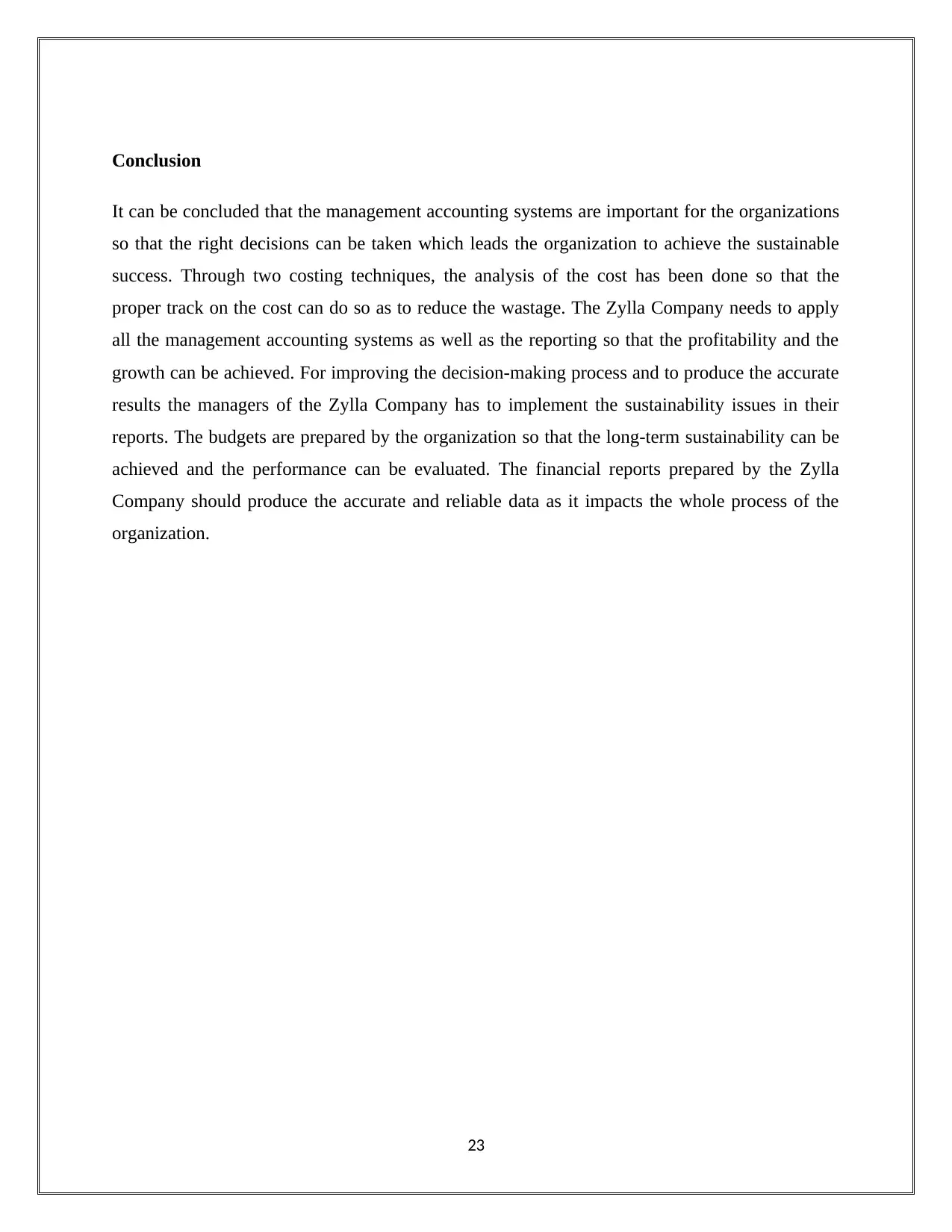
Conclusion
It can be concluded that the management accounting systems are important for the organizations
so that the right decisions can be taken which leads the organization to achieve the sustainable
success. Through two costing techniques, the analysis of the cost has been done so that the
proper track on the cost can do so as to reduce the wastage. The Zylla Company needs to apply
all the management accounting systems as well as the reporting so that the profitability and the
growth can be achieved. For improving the decision-making process and to produce the accurate
results the managers of the Zylla Company has to implement the sustainability issues in their
reports. The budgets are prepared by the organization so that the long-term sustainability can be
achieved and the performance can be evaluated. The financial reports prepared by the Zylla
Company should produce the accurate and reliable data as it impacts the whole process of the
organization.
23
It can be concluded that the management accounting systems are important for the organizations
so that the right decisions can be taken which leads the organization to achieve the sustainable
success. Through two costing techniques, the analysis of the cost has been done so that the
proper track on the cost can do so as to reduce the wastage. The Zylla Company needs to apply
all the management accounting systems as well as the reporting so that the profitability and the
growth can be achieved. For improving the decision-making process and to produce the accurate
results the managers of the Zylla Company has to implement the sustainability issues in their
reports. The budgets are prepared by the organization so that the long-term sustainability can be
achieved and the performance can be evaluated. The financial reports prepared by the Zylla
Company should produce the accurate and reliable data as it impacts the whole process of the
organization.
23
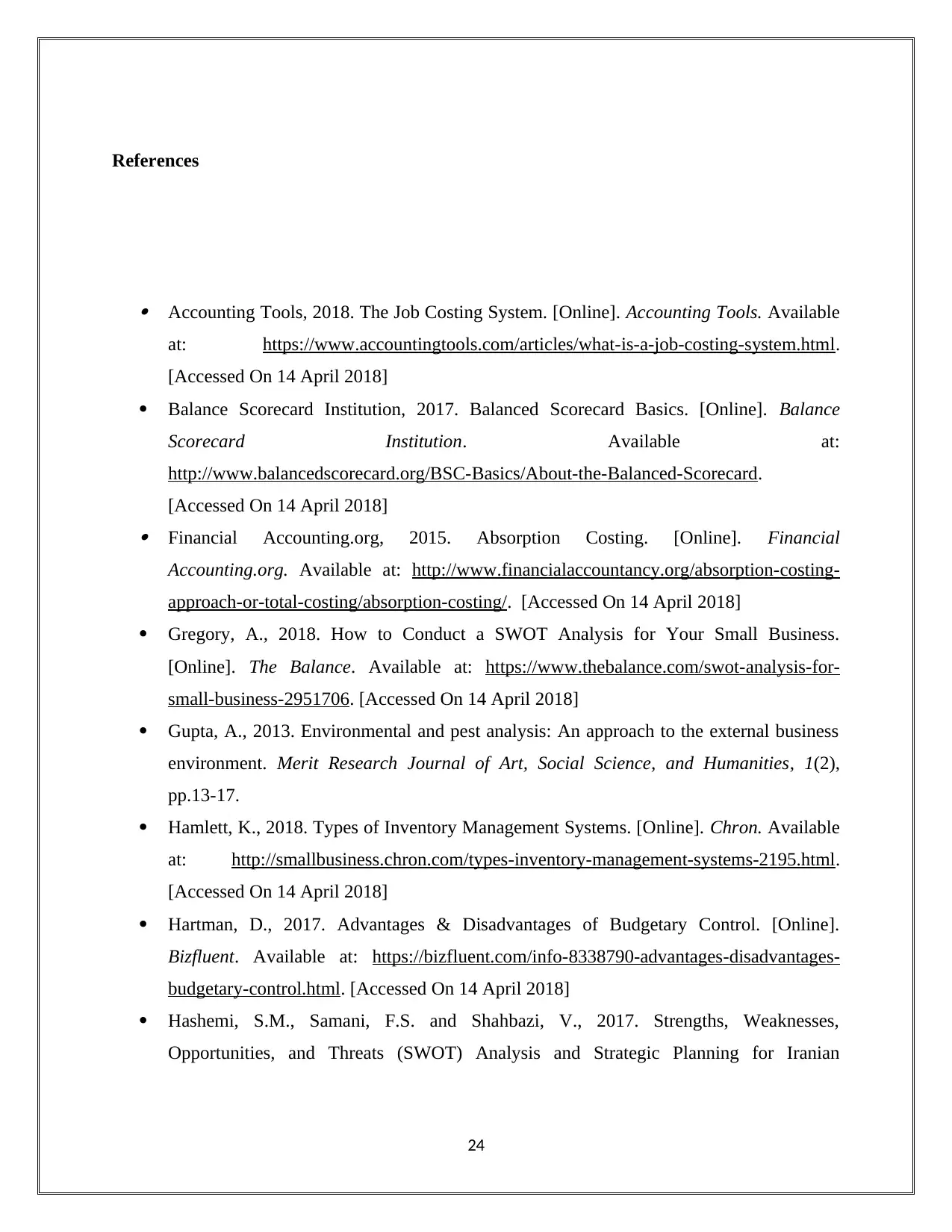
References
Accounting Tools, 2018. The Job Costing System. [Online]. Accounting Tools. Available
at: https://www.accountingtools.com/articles/what-is-a-job-costing-system.html.
[Accessed On 14 April 2018]
Balance Scorecard Institution, 2017. Balanced Scorecard Basics. [Online]. Balance
Scorecard Institution. Available at:
http://www.balancedscorecard.org/BSC-Basics/About-the-Balanced-Scorecard.
[Accessed On 14 April 2018] Financial Accounting.org, 2015. Absorption Costing. [Online]. Financial
Accounting.org. Available at: http://www.financialaccountancy.org/absorption-costing-
approach-or-total-costing/absorption-costing/. [Accessed On 14 April 2018]
Gregory, A., 2018. How to Conduct a SWOT Analysis for Your Small Business.
[Online]. The Balance. Available at: https://www.thebalance.com/swot-analysis-for-
small-business-2951706. [Accessed On 14 April 2018]
Gupta, A., 2013. Environmental and pest analysis: An approach to the external business
environment. Merit Research Journal of Art, Social Science, and Humanities, 1(2),
pp.13-17.
Hamlett, K., 2018. Types of Inventory Management Systems. [Online]. Chron. Available
at: http://smallbusiness.chron.com/types-inventory-management-systems-2195.html.
[Accessed On 14 April 2018]
Hartman, D., 2017. Advantages & Disadvantages of Budgetary Control. [Online].
Bizfluent. Available at: https://bizfluent.com/info-8338790-advantages-disadvantages-
budgetary-control.html. [Accessed On 14 April 2018]
Hashemi, S.M., Samani, F.S. and Shahbazi, V., 2017. Strengths, Weaknesses,
Opportunities, and Threats (SWOT) Analysis and Strategic Planning for Iranian
24
Accounting Tools, 2018. The Job Costing System. [Online]. Accounting Tools. Available
at: https://www.accountingtools.com/articles/what-is-a-job-costing-system.html.
[Accessed On 14 April 2018]
Balance Scorecard Institution, 2017. Balanced Scorecard Basics. [Online]. Balance
Scorecard Institution. Available at:
http://www.balancedscorecard.org/BSC-Basics/About-the-Balanced-Scorecard.
[Accessed On 14 April 2018] Financial Accounting.org, 2015. Absorption Costing. [Online]. Financial
Accounting.org. Available at: http://www.financialaccountancy.org/absorption-costing-
approach-or-total-costing/absorption-costing/. [Accessed On 14 April 2018]
Gregory, A., 2018. How to Conduct a SWOT Analysis for Your Small Business.
[Online]. The Balance. Available at: https://www.thebalance.com/swot-analysis-for-
small-business-2951706. [Accessed On 14 April 2018]
Gupta, A., 2013. Environmental and pest analysis: An approach to the external business
environment. Merit Research Journal of Art, Social Science, and Humanities, 1(2),
pp.13-17.
Hamlett, K., 2018. Types of Inventory Management Systems. [Online]. Chron. Available
at: http://smallbusiness.chron.com/types-inventory-management-systems-2195.html.
[Accessed On 14 April 2018]
Hartman, D., 2017. Advantages & Disadvantages of Budgetary Control. [Online].
Bizfluent. Available at: https://bizfluent.com/info-8338790-advantages-disadvantages-
budgetary-control.html. [Accessed On 14 April 2018]
Hashemi, S.M., Samani, F.S. and Shahbazi, V., 2017. Strengths, Weaknesses,
Opportunities, and Threats (SWOT) Analysis and Strategic Planning for Iranian
24
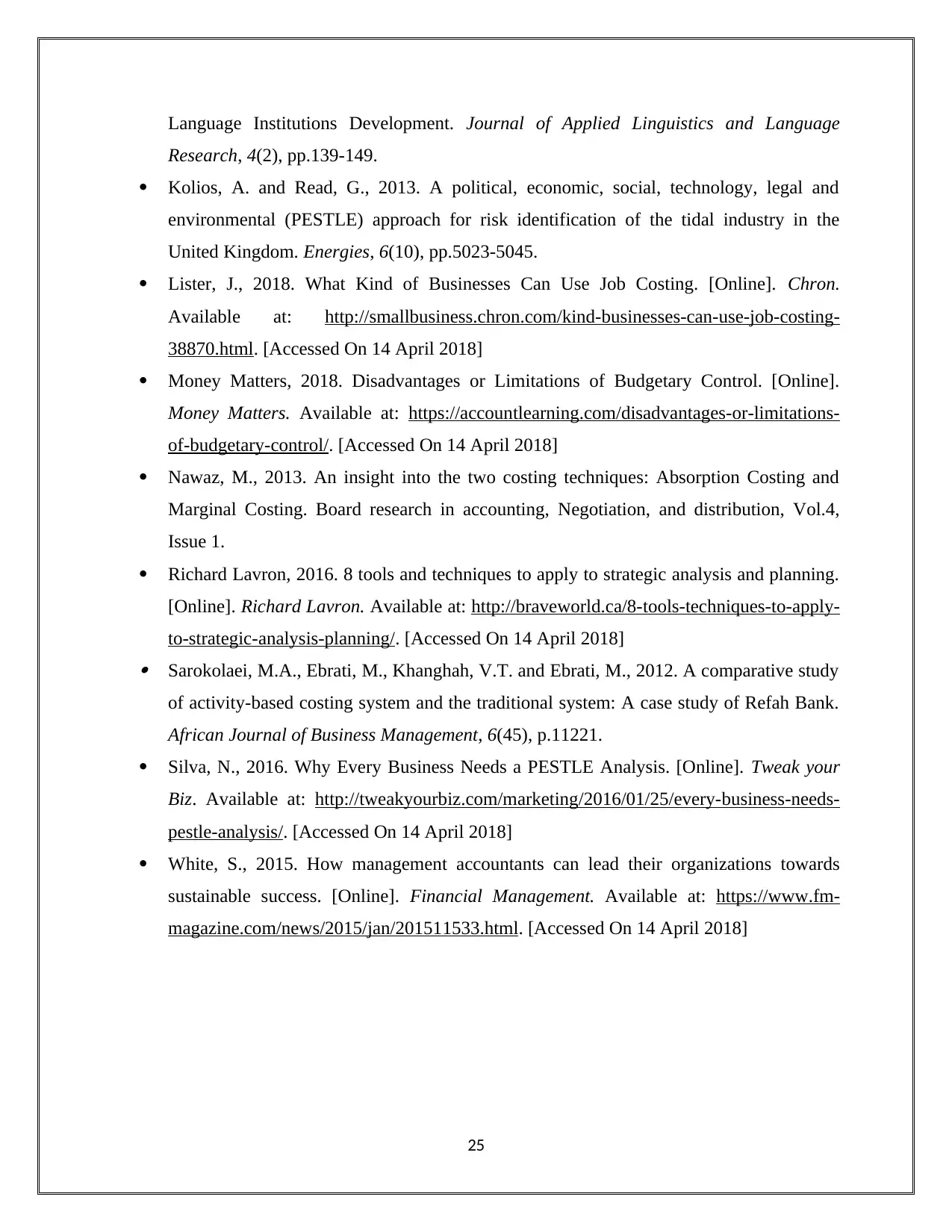
Language Institutions Development. Journal of Applied Linguistics and Language
Research, 4(2), pp.139-149.
Kolios, A. and Read, G., 2013. A political, economic, social, technology, legal and
environmental (PESTLE) approach for risk identification of the tidal industry in the
United Kingdom. Energies, 6(10), pp.5023-5045.
Lister, J., 2018. What Kind of Businesses Can Use Job Costing. [Online]. Chron.
Available at: http://smallbusiness.chron.com/kind-businesses-can-use-job-costing-
38870.html. [Accessed On 14 April 2018]
Money Matters, 2018. Disadvantages or Limitations of Budgetary Control. [Online].
Money Matters. Available at: https://accountlearning.com/disadvantages-or-limitations-
of-budgetary-control/. [Accessed On 14 April 2018]
Nawaz, M., 2013. An insight into the two costing techniques: Absorption Costing and
Marginal Costing. Board research in accounting, Negotiation, and distribution, Vol.4,
Issue 1.
Richard Lavron, 2016. 8 tools and techniques to apply to strategic analysis and planning.
[Online]. Richard Lavron. Available at: http://braveworld.ca/8-tools-techniques-to-apply-
to-strategic-analysis-planning/. [Accessed On 14 April 2018] Sarokolaei, M.A., Ebrati, M., Khanghah, V.T. and Ebrati, M., 2012. A comparative study
of activity-based costing system and the traditional system: A case study of Refah Bank.
African Journal of Business Management, 6(45), p.11221.
Silva, N., 2016. Why Every Business Needs a PESTLE Analysis. [Online]. Tweak your
Biz. Available at: http://tweakyourbiz.com/marketing/2016/01/25/every-business-needs-
pestle-analysis/. [Accessed On 14 April 2018]
White, S., 2015. How management accountants can lead their organizations towards
sustainable success. [Online]. Financial Management. Available at: https://www.fm-
magazine.com/news/2015/jan/201511533.html. [Accessed On 14 April 2018]
25
Research, 4(2), pp.139-149.
Kolios, A. and Read, G., 2013. A political, economic, social, technology, legal and
environmental (PESTLE) approach for risk identification of the tidal industry in the
United Kingdom. Energies, 6(10), pp.5023-5045.
Lister, J., 2018. What Kind of Businesses Can Use Job Costing. [Online]. Chron.
Available at: http://smallbusiness.chron.com/kind-businesses-can-use-job-costing-
38870.html. [Accessed On 14 April 2018]
Money Matters, 2018. Disadvantages or Limitations of Budgetary Control. [Online].
Money Matters. Available at: https://accountlearning.com/disadvantages-or-limitations-
of-budgetary-control/. [Accessed On 14 April 2018]
Nawaz, M., 2013. An insight into the two costing techniques: Absorption Costing and
Marginal Costing. Board research in accounting, Negotiation, and distribution, Vol.4,
Issue 1.
Richard Lavron, 2016. 8 tools and techniques to apply to strategic analysis and planning.
[Online]. Richard Lavron. Available at: http://braveworld.ca/8-tools-techniques-to-apply-
to-strategic-analysis-planning/. [Accessed On 14 April 2018] Sarokolaei, M.A., Ebrati, M., Khanghah, V.T. and Ebrati, M., 2012. A comparative study
of activity-based costing system and the traditional system: A case study of Refah Bank.
African Journal of Business Management, 6(45), p.11221.
Silva, N., 2016. Why Every Business Needs a PESTLE Analysis. [Online]. Tweak your
Biz. Available at: http://tweakyourbiz.com/marketing/2016/01/25/every-business-needs-
pestle-analysis/. [Accessed On 14 April 2018]
White, S., 2015. How management accountants can lead their organizations towards
sustainable success. [Online]. Financial Management. Available at: https://www.fm-
magazine.com/news/2015/jan/201511533.html. [Accessed On 14 April 2018]
25
1 out of 25
Related Documents
Your All-in-One AI-Powered Toolkit for Academic Success.
+13062052269
info@desklib.com
Available 24*7 on WhatsApp / Email
![[object Object]](/_next/static/media/star-bottom.7253800d.svg)
Unlock your academic potential
© 2024 | Zucol Services PVT LTD | All rights reserved.





